Financial Regulation in China and UK
VerifiedAdded on 2020/03/16
|21
|4539
|215
AI Summary
This assignment requires a comparative analysis of financial regulation frameworks in China and the UK. It delves into the historical development, key regulatory bodies, specific policies, and their influence on market stability, firm performance, and overall economic growth. The analysis should also consider the challenges and opportunities presented by global trends in financial regulation and explore areas of convergence and divergence between the two systems.
Contribute Materials
Your contribution can guide someone’s learning journey. Share your
documents today.
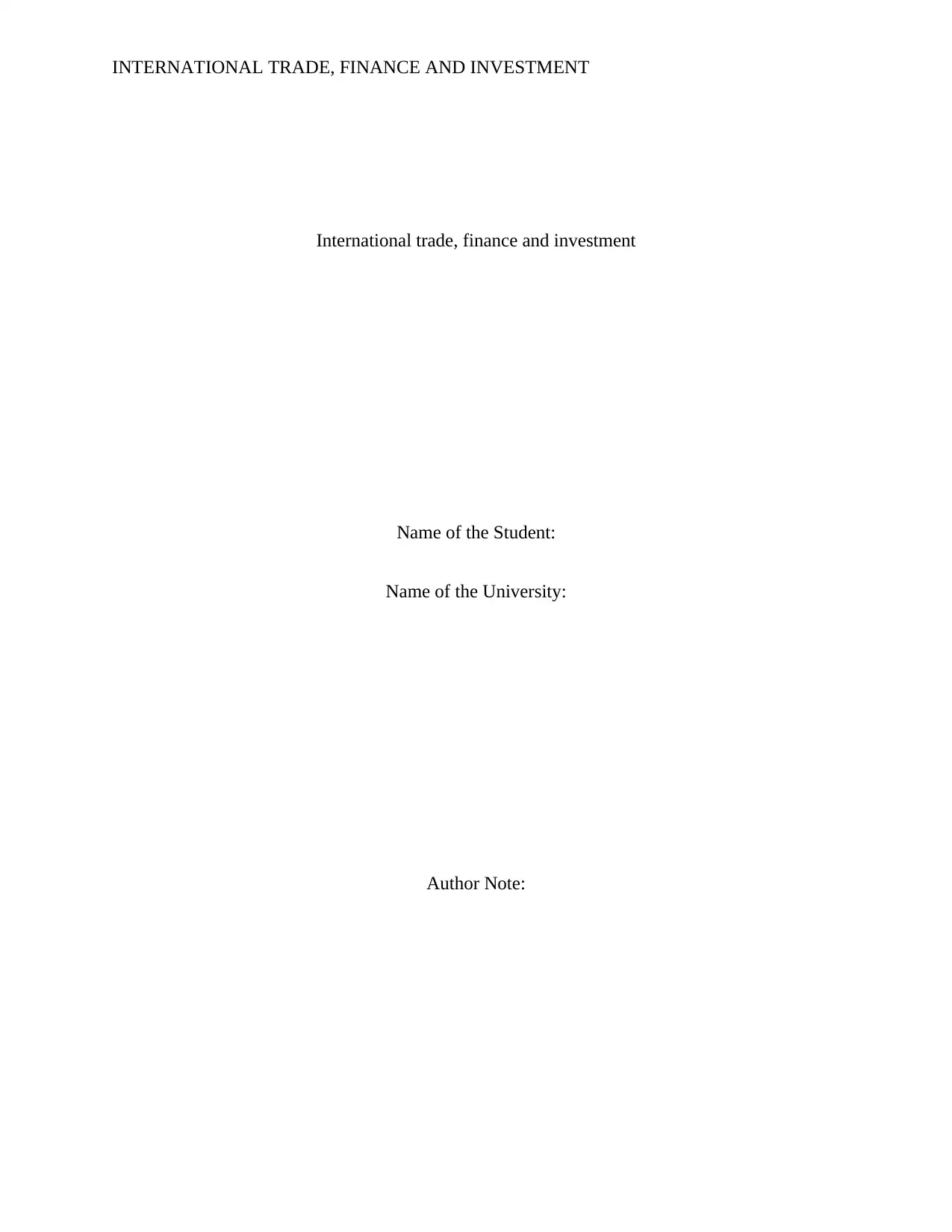
INTERNATIONAL TRADE, FINANCE AND INVESTMENT
International trade, finance and investment
Name of the Student:
Name of the University:
Author Note:
International trade, finance and investment
Name of the Student:
Name of the University:
Author Note:
Secure Best Marks with AI Grader
Need help grading? Try our AI Grader for instant feedback on your assignments.
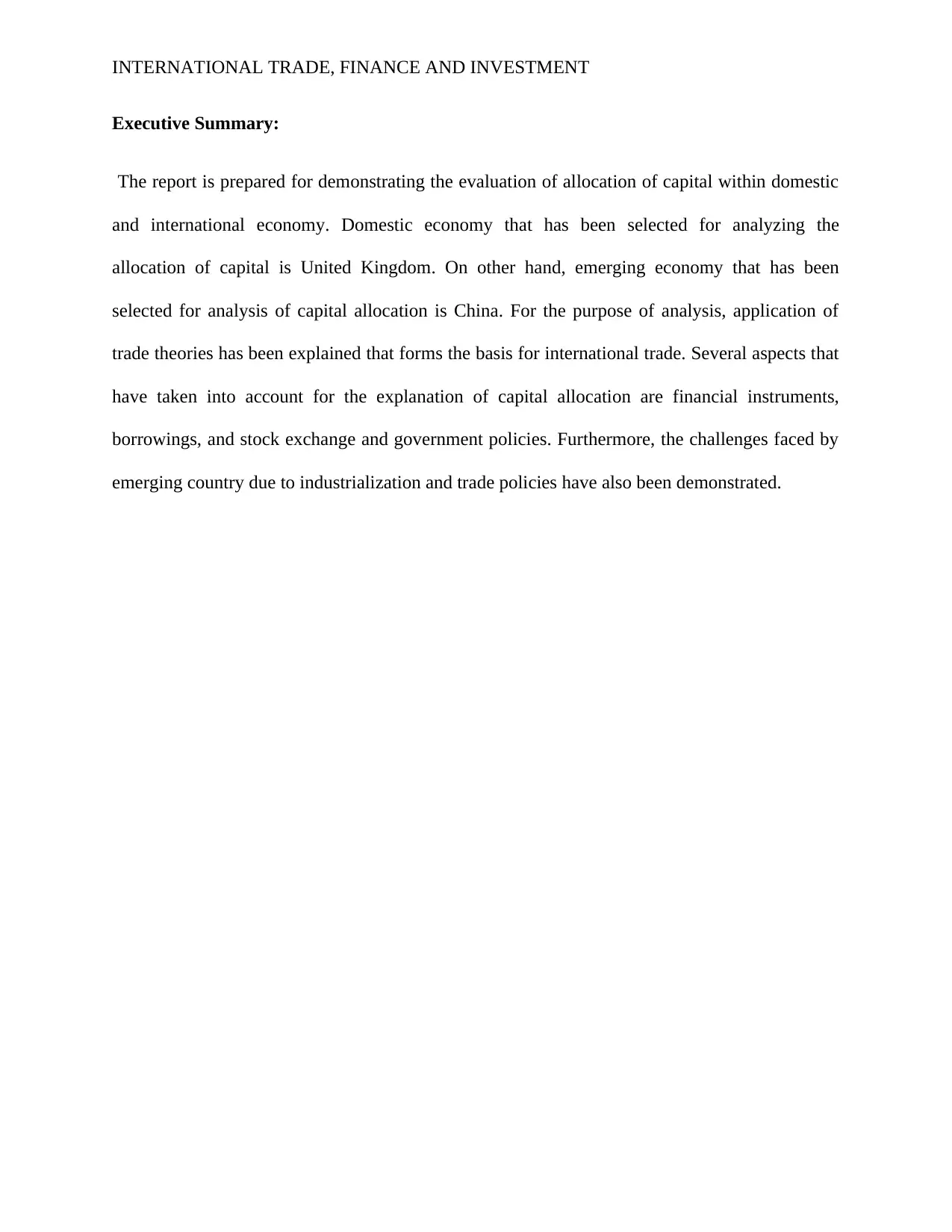
INTERNATIONAL TRADE, FINANCE AND INVESTMENT
Executive Summary:
The report is prepared for demonstrating the evaluation of allocation of capital within domestic
and international economy. Domestic economy that has been selected for analyzing the
allocation of capital is United Kingdom. On other hand, emerging economy that has been
selected for analysis of capital allocation is China. For the purpose of analysis, application of
trade theories has been explained that forms the basis for international trade. Several aspects that
have taken into account for the explanation of capital allocation are financial instruments,
borrowings, and stock exchange and government policies. Furthermore, the challenges faced by
emerging country due to industrialization and trade policies have also been demonstrated.
Executive Summary:
The report is prepared for demonstrating the evaluation of allocation of capital within domestic
and international economy. Domestic economy that has been selected for analyzing the
allocation of capital is United Kingdom. On other hand, emerging economy that has been
selected for analysis of capital allocation is China. For the purpose of analysis, application of
trade theories has been explained that forms the basis for international trade. Several aspects that
have taken into account for the explanation of capital allocation are financial instruments,
borrowings, and stock exchange and government policies. Furthermore, the challenges faced by
emerging country due to industrialization and trade policies have also been demonstrated.
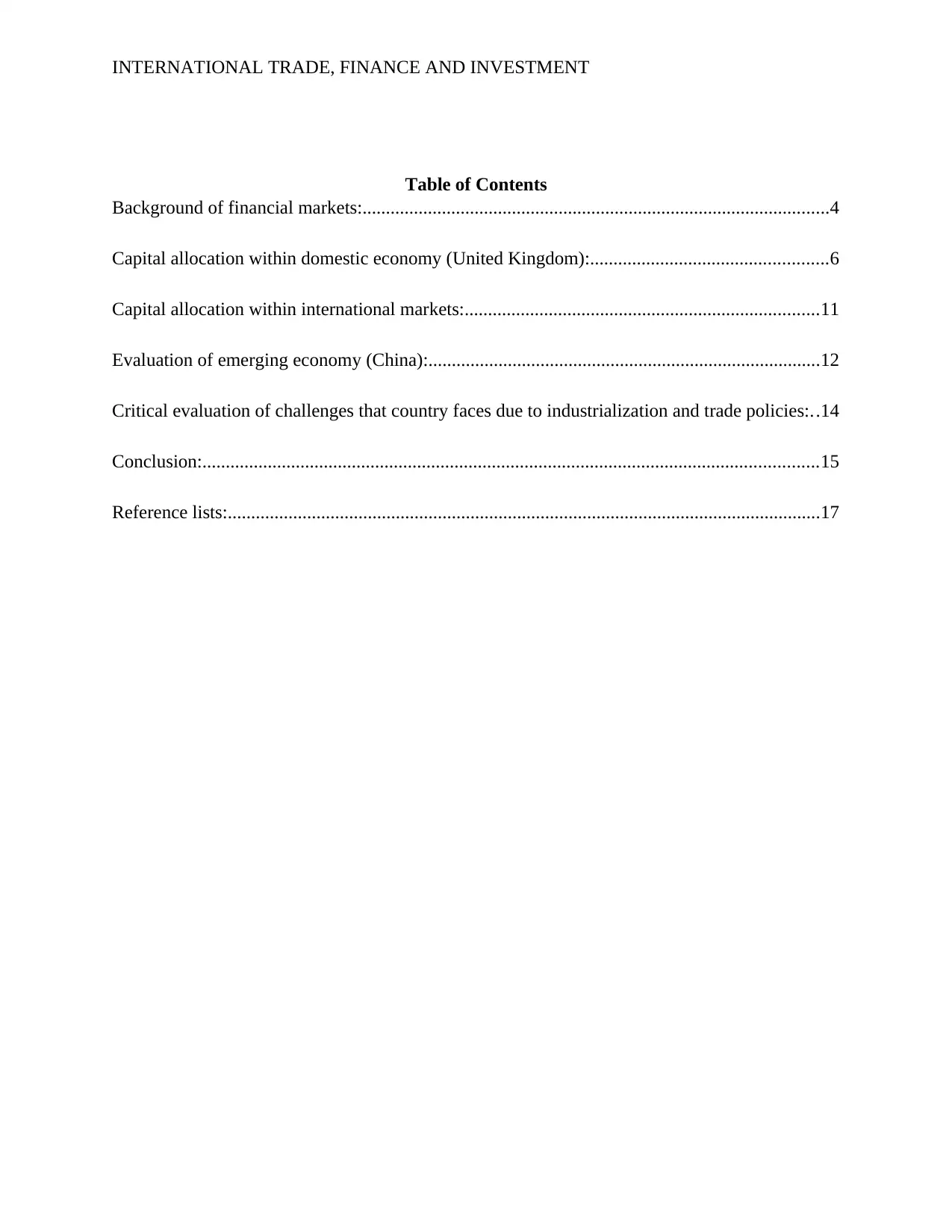
INTERNATIONAL TRADE, FINANCE AND INVESTMENT
Table of Contents
Background of financial markets:....................................................................................................4
Capital allocation within domestic economy (United Kingdom):...................................................6
Capital allocation within international markets:............................................................................11
Evaluation of emerging economy (China):....................................................................................12
Critical evaluation of challenges that country faces due to industrialization and trade policies:..14
Conclusion:....................................................................................................................................15
Reference lists:...............................................................................................................................17
Table of Contents
Background of financial markets:....................................................................................................4
Capital allocation within domestic economy (United Kingdom):...................................................6
Capital allocation within international markets:............................................................................11
Evaluation of emerging economy (China):....................................................................................12
Critical evaluation of challenges that country faces due to industrialization and trade policies:..14
Conclusion:....................................................................................................................................15
Reference lists:...............................................................................................................................17
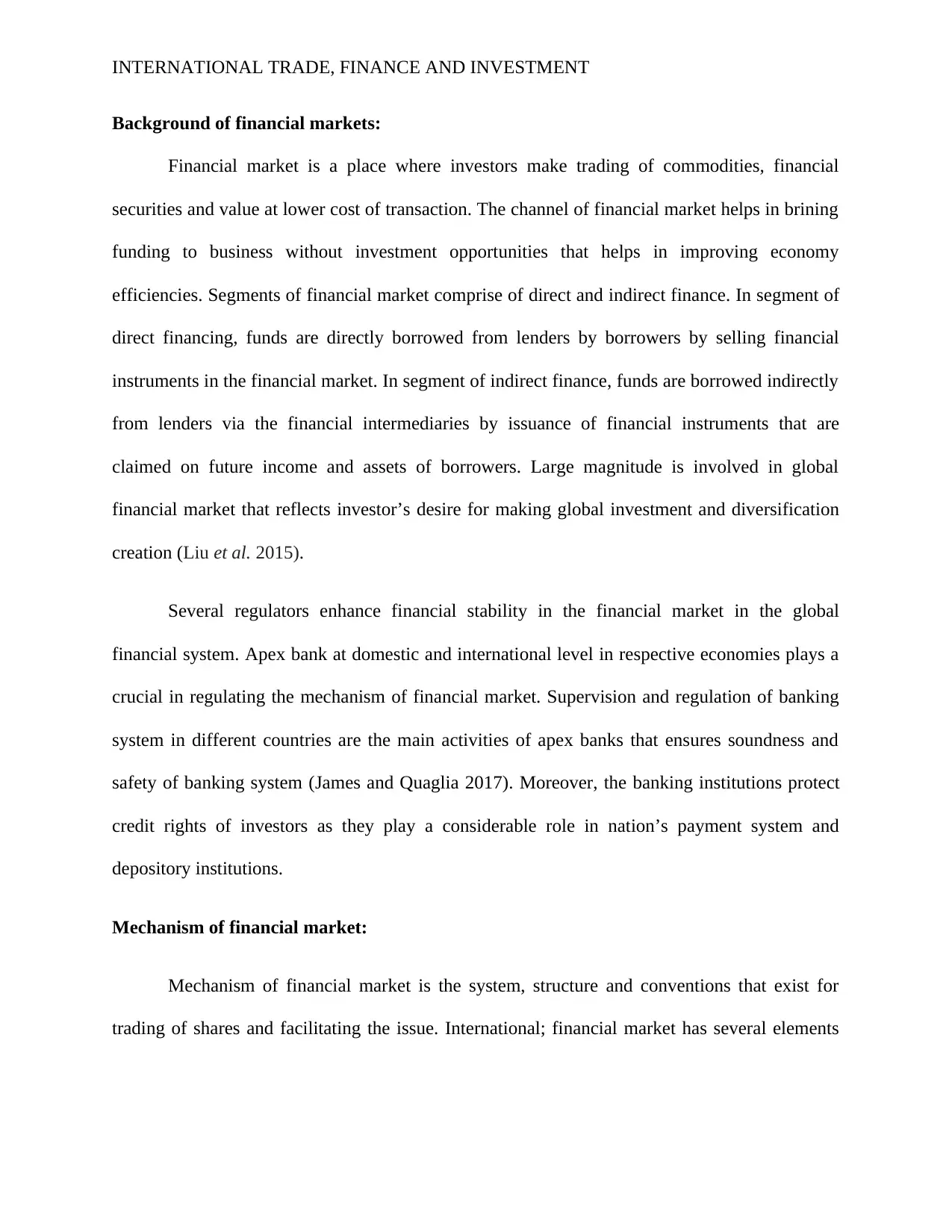
INTERNATIONAL TRADE, FINANCE AND INVESTMENT
Background of financial markets:
Financial market is a place where investors make trading of commodities, financial
securities and value at lower cost of transaction. The channel of financial market helps in brining
funding to business without investment opportunities that helps in improving economy
efficiencies. Segments of financial market comprise of direct and indirect finance. In segment of
direct financing, funds are directly borrowed from lenders by borrowers by selling financial
instruments in the financial market. In segment of indirect finance, funds are borrowed indirectly
from lenders via the financial intermediaries by issuance of financial instruments that are
claimed on future income and assets of borrowers. Large magnitude is involved in global
financial market that reflects investor’s desire for making global investment and diversification
creation (Liu et al. 2015).
Several regulators enhance financial stability in the financial market in the global
financial system. Apex bank at domestic and international level in respective economies plays a
crucial in regulating the mechanism of financial market. Supervision and regulation of banking
system in different countries are the main activities of apex banks that ensures soundness and
safety of banking system (James and Quaglia 2017). Moreover, the banking institutions protect
credit rights of investors as they play a considerable role in nation’s payment system and
depository institutions.
Mechanism of financial market:
Mechanism of financial market is the system, structure and conventions that exist for
trading of shares and facilitating the issue. International; financial market has several elements
Background of financial markets:
Financial market is a place where investors make trading of commodities, financial
securities and value at lower cost of transaction. The channel of financial market helps in brining
funding to business without investment opportunities that helps in improving economy
efficiencies. Segments of financial market comprise of direct and indirect finance. In segment of
direct financing, funds are directly borrowed from lenders by borrowers by selling financial
instruments in the financial market. In segment of indirect finance, funds are borrowed indirectly
from lenders via the financial intermediaries by issuance of financial instruments that are
claimed on future income and assets of borrowers. Large magnitude is involved in global
financial market that reflects investor’s desire for making global investment and diversification
creation (Liu et al. 2015).
Several regulators enhance financial stability in the financial market in the global
financial system. Apex bank at domestic and international level in respective economies plays a
crucial in regulating the mechanism of financial market. Supervision and regulation of banking
system in different countries are the main activities of apex banks that ensures soundness and
safety of banking system (James and Quaglia 2017). Moreover, the banking institutions protect
credit rights of investors as they play a considerable role in nation’s payment system and
depository institutions.
Mechanism of financial market:
Mechanism of financial market is the system, structure and conventions that exist for
trading of shares and facilitating the issue. International; financial market has several elements
Secure Best Marks with AI Grader
Need help grading? Try our AI Grader for instant feedback on your assignments.
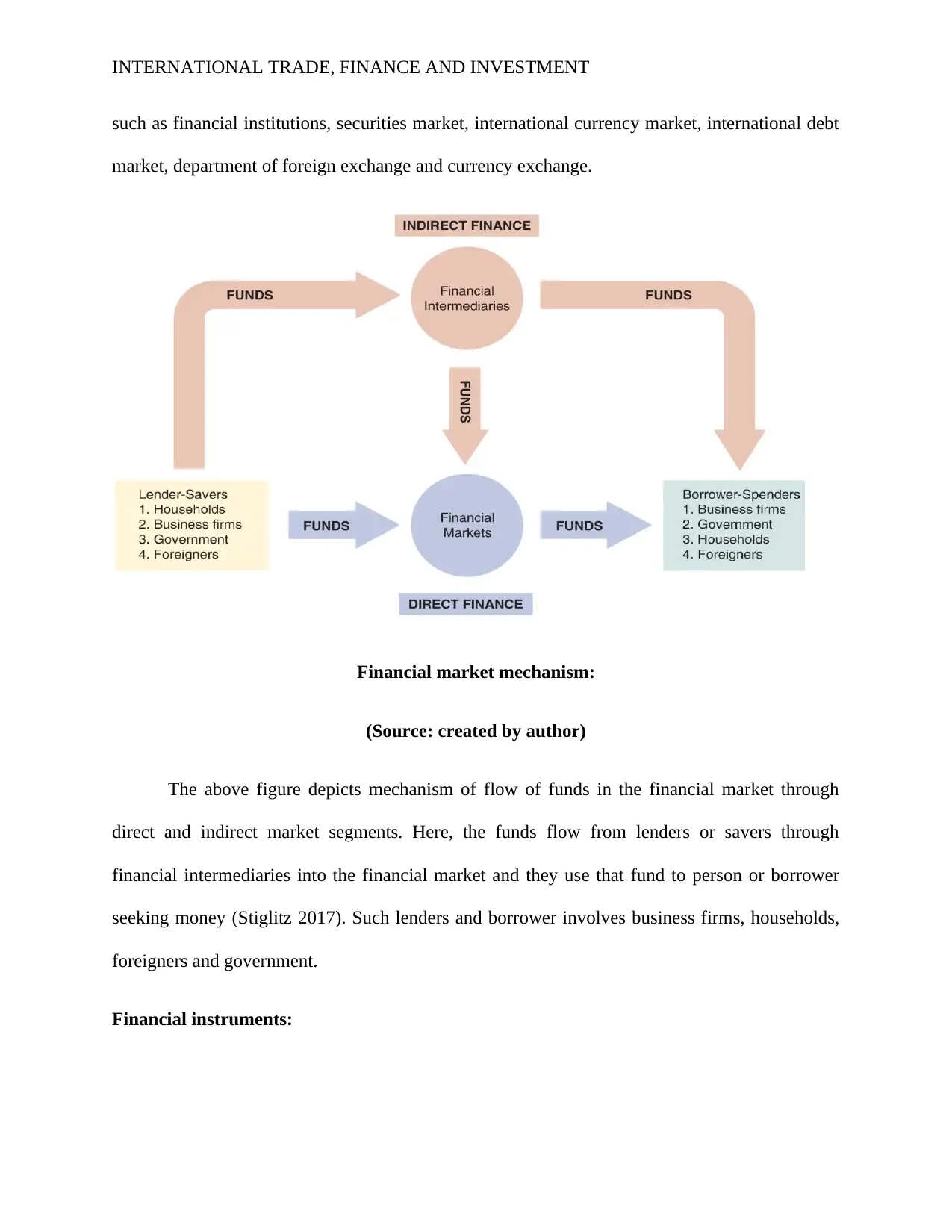
INTERNATIONAL TRADE, FINANCE AND INVESTMENT
such as financial institutions, securities market, international currency market, international debt
market, department of foreign exchange and currency exchange.
Financial market mechanism:
(Source: created by author)
The above figure depicts mechanism of flow of funds in the financial market through
direct and indirect market segments. Here, the funds flow from lenders or savers through
financial intermediaries into the financial market and they use that fund to person or borrower
seeking money (Stiglitz 2017). Such lenders and borrower involves business firms, households,
foreigners and government.
Financial instruments:
such as financial institutions, securities market, international currency market, international debt
market, department of foreign exchange and currency exchange.
Financial market mechanism:
(Source: created by author)
The above figure depicts mechanism of flow of funds in the financial market through
direct and indirect market segments. Here, the funds flow from lenders or savers through
financial intermediaries into the financial market and they use that fund to person or borrower
seeking money (Stiglitz 2017). Such lenders and borrower involves business firms, households,
foreigners and government.
Financial instruments:
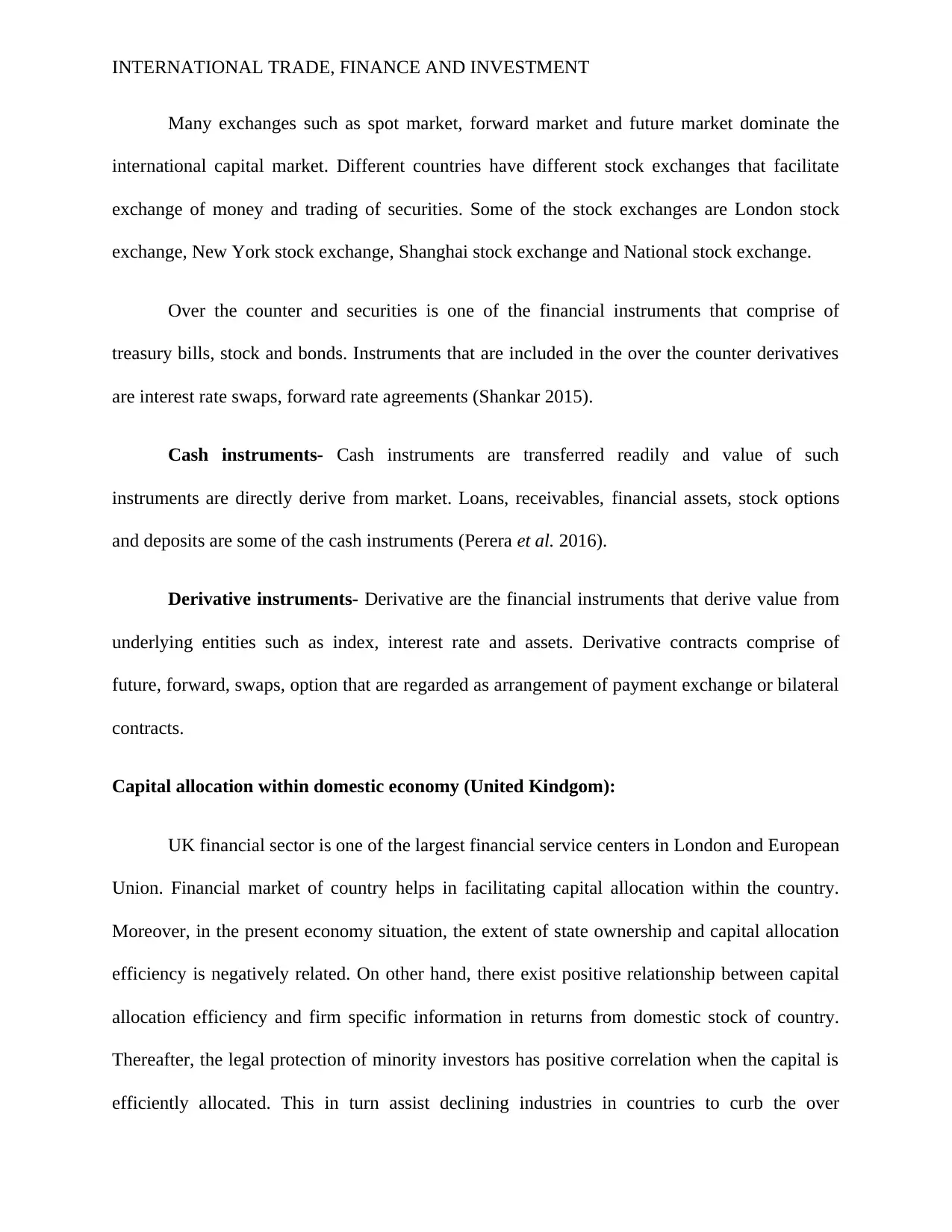
INTERNATIONAL TRADE, FINANCE AND INVESTMENT
Many exchanges such as spot market, forward market and future market dominate the
international capital market. Different countries have different stock exchanges that facilitate
exchange of money and trading of securities. Some of the stock exchanges are London stock
exchange, New York stock exchange, Shanghai stock exchange and National stock exchange.
Over the counter and securities is one of the financial instruments that comprise of
treasury bills, stock and bonds. Instruments that are included in the over the counter derivatives
are interest rate swaps, forward rate agreements (Shankar 2015).
Cash instruments- Cash instruments are transferred readily and value of such
instruments are directly derive from market. Loans, receivables, financial assets, stock options
and deposits are some of the cash instruments (Perera et al. 2016).
Derivative instruments- Derivative are the financial instruments that derive value from
underlying entities such as index, interest rate and assets. Derivative contracts comprise of
future, forward, swaps, option that are regarded as arrangement of payment exchange or bilateral
contracts.
Capital allocation within domestic economy (United Kindgom):
UK financial sector is one of the largest financial service centers in London and European
Union. Financial market of country helps in facilitating capital allocation within the country.
Moreover, in the present economy situation, the extent of state ownership and capital allocation
efficiency is negatively related. On other hand, there exist positive relationship between capital
allocation efficiency and firm specific information in returns from domestic stock of country.
Thereafter, the legal protection of minority investors has positive correlation when the capital is
efficiently allocated. This in turn assist declining industries in countries to curb the over
Many exchanges such as spot market, forward market and future market dominate the
international capital market. Different countries have different stock exchanges that facilitate
exchange of money and trading of securities. Some of the stock exchanges are London stock
exchange, New York stock exchange, Shanghai stock exchange and National stock exchange.
Over the counter and securities is one of the financial instruments that comprise of
treasury bills, stock and bonds. Instruments that are included in the over the counter derivatives
are interest rate swaps, forward rate agreements (Shankar 2015).
Cash instruments- Cash instruments are transferred readily and value of such
instruments are directly derive from market. Loans, receivables, financial assets, stock options
and deposits are some of the cash instruments (Perera et al. 2016).
Derivative instruments- Derivative are the financial instruments that derive value from
underlying entities such as index, interest rate and assets. Derivative contracts comprise of
future, forward, swaps, option that are regarded as arrangement of payment exchange or bilateral
contracts.
Capital allocation within domestic economy (United Kindgom):
UK financial sector is one of the largest financial service centers in London and European
Union. Financial market of country helps in facilitating capital allocation within the country.
Moreover, in the present economy situation, the extent of state ownership and capital allocation
efficiency is negatively related. On other hand, there exist positive relationship between capital
allocation efficiency and firm specific information in returns from domestic stock of country.
Thereafter, the legal protection of minority investors has positive correlation when the capital is
efficiently allocated. This in turn assist declining industries in countries to curb the over
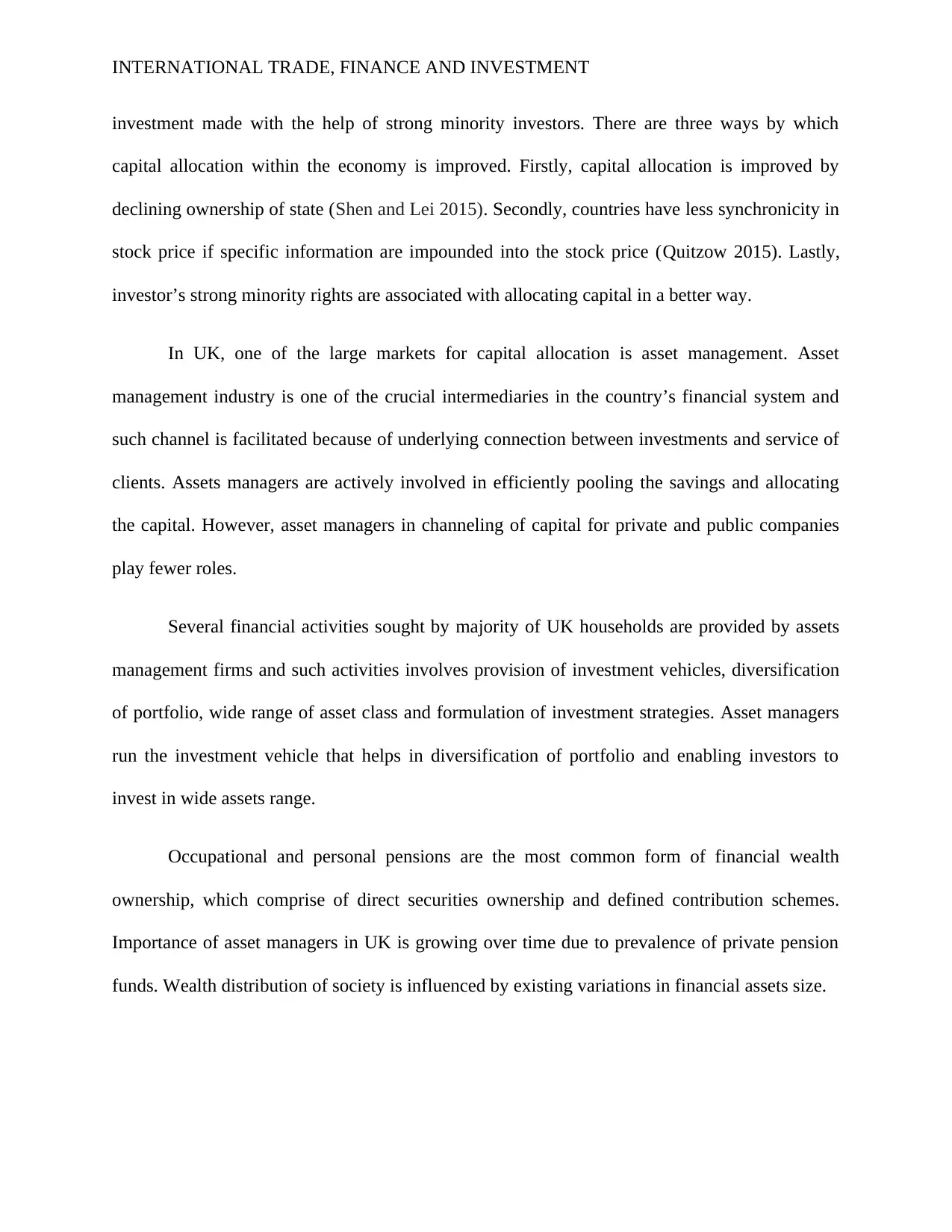
INTERNATIONAL TRADE, FINANCE AND INVESTMENT
investment made with the help of strong minority investors. There are three ways by which
capital allocation within the economy is improved. Firstly, capital allocation is improved by
declining ownership of state (Shen and Lei 2015). Secondly, countries have less synchronicity in
stock price if specific information are impounded into the stock price (Quitzow 2015). Lastly,
investor’s strong minority rights are associated with allocating capital in a better way.
In UK, one of the large markets for capital allocation is asset management. Asset
management industry is one of the crucial intermediaries in the country’s financial system and
such channel is facilitated because of underlying connection between investments and service of
clients. Assets managers are actively involved in efficiently pooling the savings and allocating
the capital. However, asset managers in channeling of capital for private and public companies
play fewer roles.
Several financial activities sought by majority of UK households are provided by assets
management firms and such activities involves provision of investment vehicles, diversification
of portfolio, wide range of asset class and formulation of investment strategies. Asset managers
run the investment vehicle that helps in diversification of portfolio and enabling investors to
invest in wide assets range.
Occupational and personal pensions are the most common form of financial wealth
ownership, which comprise of direct securities ownership and defined contribution schemes.
Importance of asset managers in UK is growing over time due to prevalence of private pension
funds. Wealth distribution of society is influenced by existing variations in financial assets size.
investment made with the help of strong minority investors. There are three ways by which
capital allocation within the economy is improved. Firstly, capital allocation is improved by
declining ownership of state (Shen and Lei 2015). Secondly, countries have less synchronicity in
stock price if specific information are impounded into the stock price (Quitzow 2015). Lastly,
investor’s strong minority rights are associated with allocating capital in a better way.
In UK, one of the large markets for capital allocation is asset management. Asset
management industry is one of the crucial intermediaries in the country’s financial system and
such channel is facilitated because of underlying connection between investments and service of
clients. Assets managers are actively involved in efficiently pooling the savings and allocating
the capital. However, asset managers in channeling of capital for private and public companies
play fewer roles.
Several financial activities sought by majority of UK households are provided by assets
management firms and such activities involves provision of investment vehicles, diversification
of portfolio, wide range of asset class and formulation of investment strategies. Asset managers
run the investment vehicle that helps in diversification of portfolio and enabling investors to
invest in wide assets range.
Occupational and personal pensions are the most common form of financial wealth
ownership, which comprise of direct securities ownership and defined contribution schemes.
Importance of asset managers in UK is growing over time due to prevalence of private pension
funds. Wealth distribution of society is influenced by existing variations in financial assets size.
Paraphrase This Document
Need a fresh take? Get an instant paraphrase of this document with our AI Paraphraser
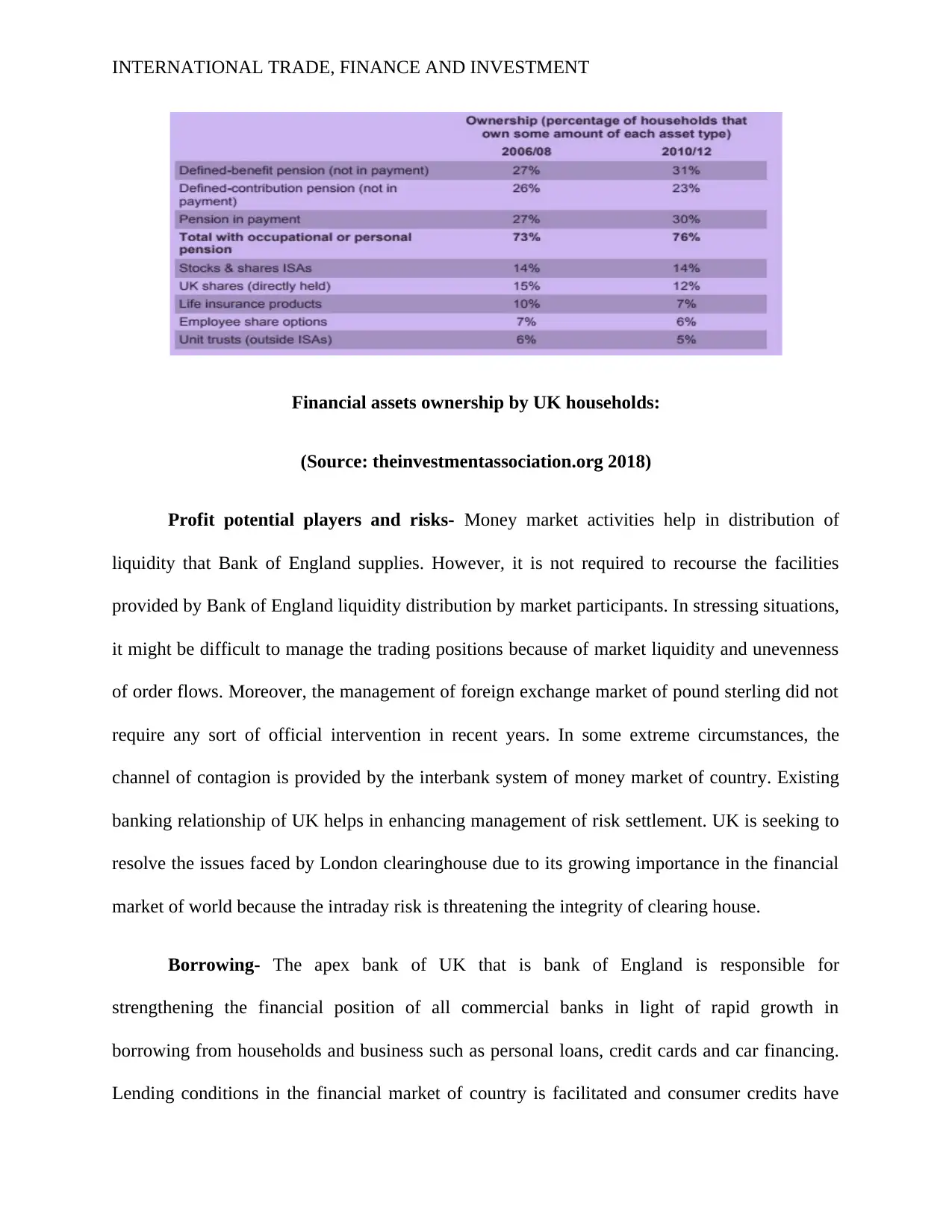
INTERNATIONAL TRADE, FINANCE AND INVESTMENT
Financial assets ownership by UK households:
(Source: theinvestmentassociation.org 2018)
Profit potential players and risks- Money market activities help in distribution of
liquidity that Bank of England supplies. However, it is not required to recourse the facilities
provided by Bank of England liquidity distribution by market participants. In stressing situations,
it might be difficult to manage the trading positions because of market liquidity and unevenness
of order flows. Moreover, the management of foreign exchange market of pound sterling did not
require any sort of official intervention in recent years. In some extreme circumstances, the
channel of contagion is provided by the interbank system of money market of country. Existing
banking relationship of UK helps in enhancing management of risk settlement. UK is seeking to
resolve the issues faced by London clearinghouse due to its growing importance in the financial
market of world because the intraday risk is threatening the integrity of clearing house.
Borrowing- The apex bank of UK that is bank of England is responsible for
strengthening the financial position of all commercial banks in light of rapid growth in
borrowing from households and business such as personal loans, credit cards and car financing.
Lending conditions in the financial market of country is facilitated and consumer credits have
Financial assets ownership by UK households:
(Source: theinvestmentassociation.org 2018)
Profit potential players and risks- Money market activities help in distribution of
liquidity that Bank of England supplies. However, it is not required to recourse the facilities
provided by Bank of England liquidity distribution by market participants. In stressing situations,
it might be difficult to manage the trading positions because of market liquidity and unevenness
of order flows. Moreover, the management of foreign exchange market of pound sterling did not
require any sort of official intervention in recent years. In some extreme circumstances, the
channel of contagion is provided by the interbank system of money market of country. Existing
banking relationship of UK helps in enhancing management of risk settlement. UK is seeking to
resolve the issues faced by London clearinghouse due to its growing importance in the financial
market of world because the intraday risk is threatening the integrity of clearing house.
Borrowing- The apex bank of UK that is bank of England is responsible for
strengthening the financial position of all commercial banks in light of rapid growth in
borrowing from households and business such as personal loans, credit cards and car financing.
Lending conditions in the financial market of country is facilitated and consumer credits have
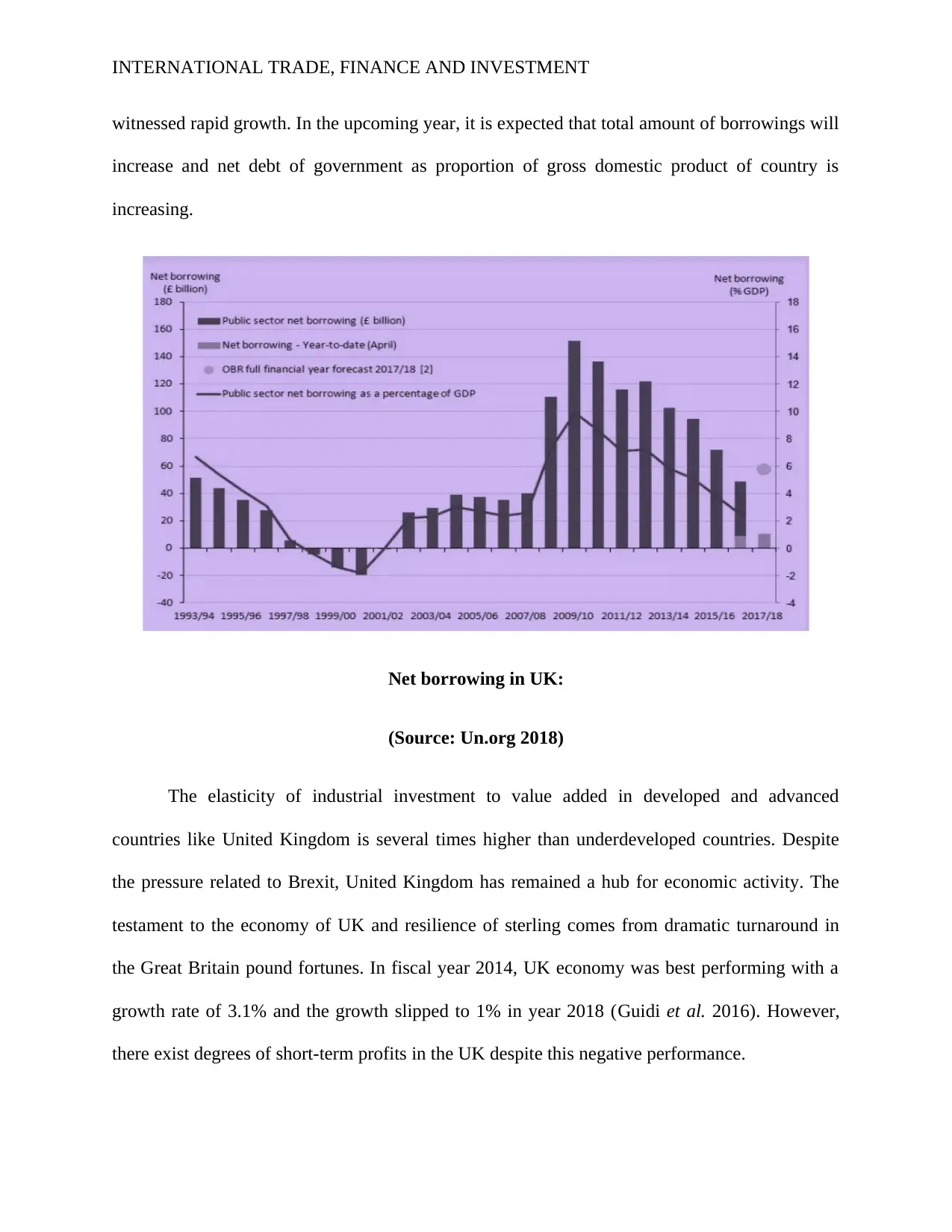
INTERNATIONAL TRADE, FINANCE AND INVESTMENT
witnessed rapid growth. In the upcoming year, it is expected that total amount of borrowings will
increase and net debt of government as proportion of gross domestic product of country is
increasing.
Net borrowing in UK:
(Source: Un.org 2018)
The elasticity of industrial investment to value added in developed and advanced
countries like United Kingdom is several times higher than underdeveloped countries. Despite
the pressure related to Brexit, United Kingdom has remained a hub for economic activity. The
testament to the economy of UK and resilience of sterling comes from dramatic turnaround in
the Great Britain pound fortunes. In fiscal year 2014, UK economy was best performing with a
growth rate of 3.1% and the growth slipped to 1% in year 2018 (Guidi et al. 2016). However,
there exist degrees of short-term profits in the UK despite this negative performance.
witnessed rapid growth. In the upcoming year, it is expected that total amount of borrowings will
increase and net debt of government as proportion of gross domestic product of country is
increasing.
Net borrowing in UK:
(Source: Un.org 2018)
The elasticity of industrial investment to value added in developed and advanced
countries like United Kingdom is several times higher than underdeveloped countries. Despite
the pressure related to Brexit, United Kingdom has remained a hub for economic activity. The
testament to the economy of UK and resilience of sterling comes from dramatic turnaround in
the Great Britain pound fortunes. In fiscal year 2014, UK economy was best performing with a
growth rate of 3.1% and the growth slipped to 1% in year 2018 (Guidi et al. 2016). However,
there exist degrees of short-term profits in the UK despite this negative performance.
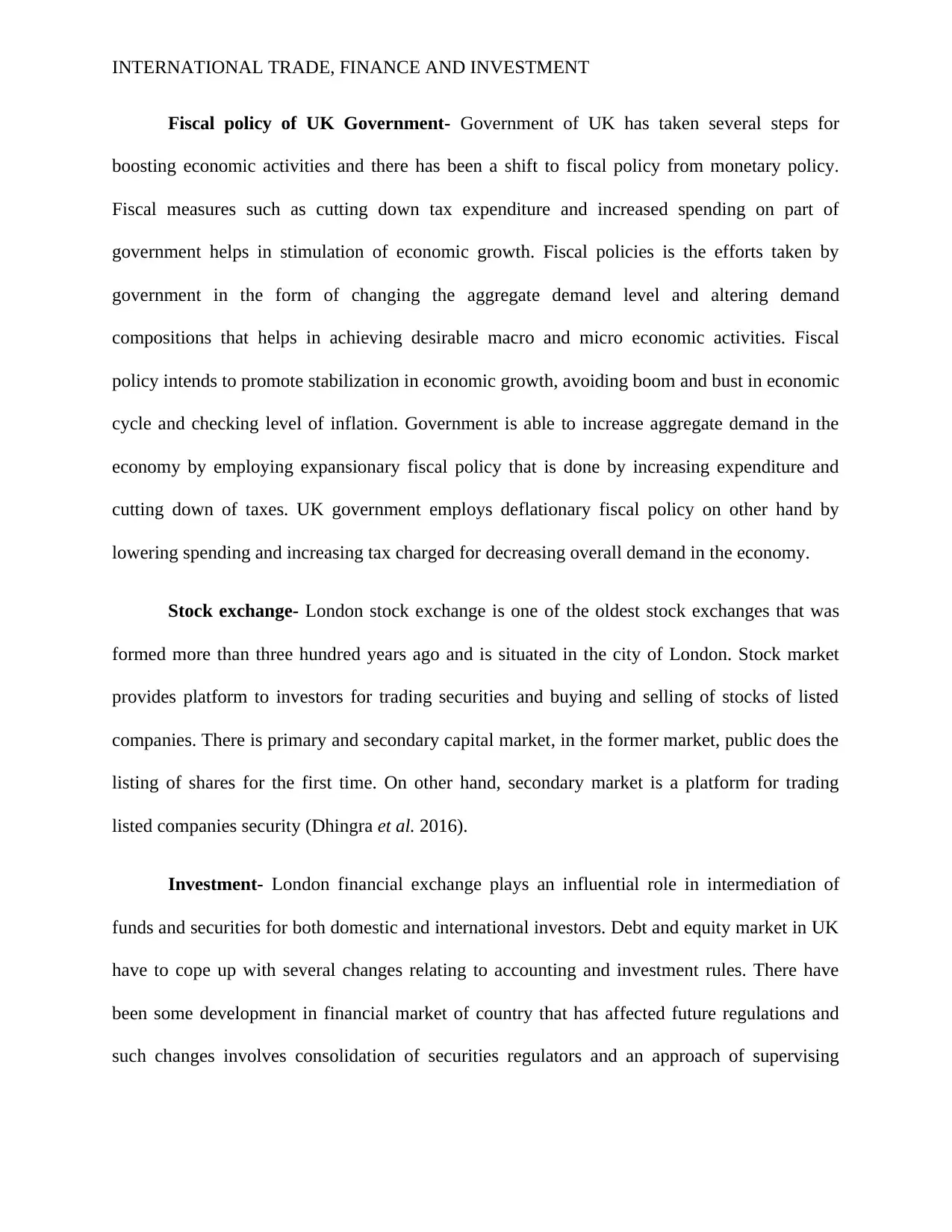
INTERNATIONAL TRADE, FINANCE AND INVESTMENT
Fiscal policy of UK Government- Government of UK has taken several steps for
boosting economic activities and there has been a shift to fiscal policy from monetary policy.
Fiscal measures such as cutting down tax expenditure and increased spending on part of
government helps in stimulation of economic growth. Fiscal policies is the efforts taken by
government in the form of changing the aggregate demand level and altering demand
compositions that helps in achieving desirable macro and micro economic activities. Fiscal
policy intends to promote stabilization in economic growth, avoiding boom and bust in economic
cycle and checking level of inflation. Government is able to increase aggregate demand in the
economy by employing expansionary fiscal policy that is done by increasing expenditure and
cutting down of taxes. UK government employs deflationary fiscal policy on other hand by
lowering spending and increasing tax charged for decreasing overall demand in the economy.
Stock exchange- London stock exchange is one of the oldest stock exchanges that was
formed more than three hundred years ago and is situated in the city of London. Stock market
provides platform to investors for trading securities and buying and selling of stocks of listed
companies. There is primary and secondary capital market, in the former market, public does the
listing of shares for the first time. On other hand, secondary market is a platform for trading
listed companies security (Dhingra et al. 2016).
Investment- London financial exchange plays an influential role in intermediation of
funds and securities for both domestic and international investors. Debt and equity market in UK
have to cope up with several changes relating to accounting and investment rules. There have
been some development in financial market of country that has affected future regulations and
such changes involves consolidation of securities regulators and an approach of supervising
Fiscal policy of UK Government- Government of UK has taken several steps for
boosting economic activities and there has been a shift to fiscal policy from monetary policy.
Fiscal measures such as cutting down tax expenditure and increased spending on part of
government helps in stimulation of economic growth. Fiscal policies is the efforts taken by
government in the form of changing the aggregate demand level and altering demand
compositions that helps in achieving desirable macro and micro economic activities. Fiscal
policy intends to promote stabilization in economic growth, avoiding boom and bust in economic
cycle and checking level of inflation. Government is able to increase aggregate demand in the
economy by employing expansionary fiscal policy that is done by increasing expenditure and
cutting down of taxes. UK government employs deflationary fiscal policy on other hand by
lowering spending and increasing tax charged for decreasing overall demand in the economy.
Stock exchange- London stock exchange is one of the oldest stock exchanges that was
formed more than three hundred years ago and is situated in the city of London. Stock market
provides platform to investors for trading securities and buying and selling of stocks of listed
companies. There is primary and secondary capital market, in the former market, public does the
listing of shares for the first time. On other hand, secondary market is a platform for trading
listed companies security (Dhingra et al. 2016).
Investment- London financial exchange plays an influential role in intermediation of
funds and securities for both domestic and international investors. Debt and equity market in UK
have to cope up with several changes relating to accounting and investment rules. There have
been some development in financial market of country that has affected future regulations and
such changes involves consolidation of securities regulators and an approach of supervising
Secure Best Marks with AI Grader
Need help grading? Try our AI Grader for instant feedback on your assignments.
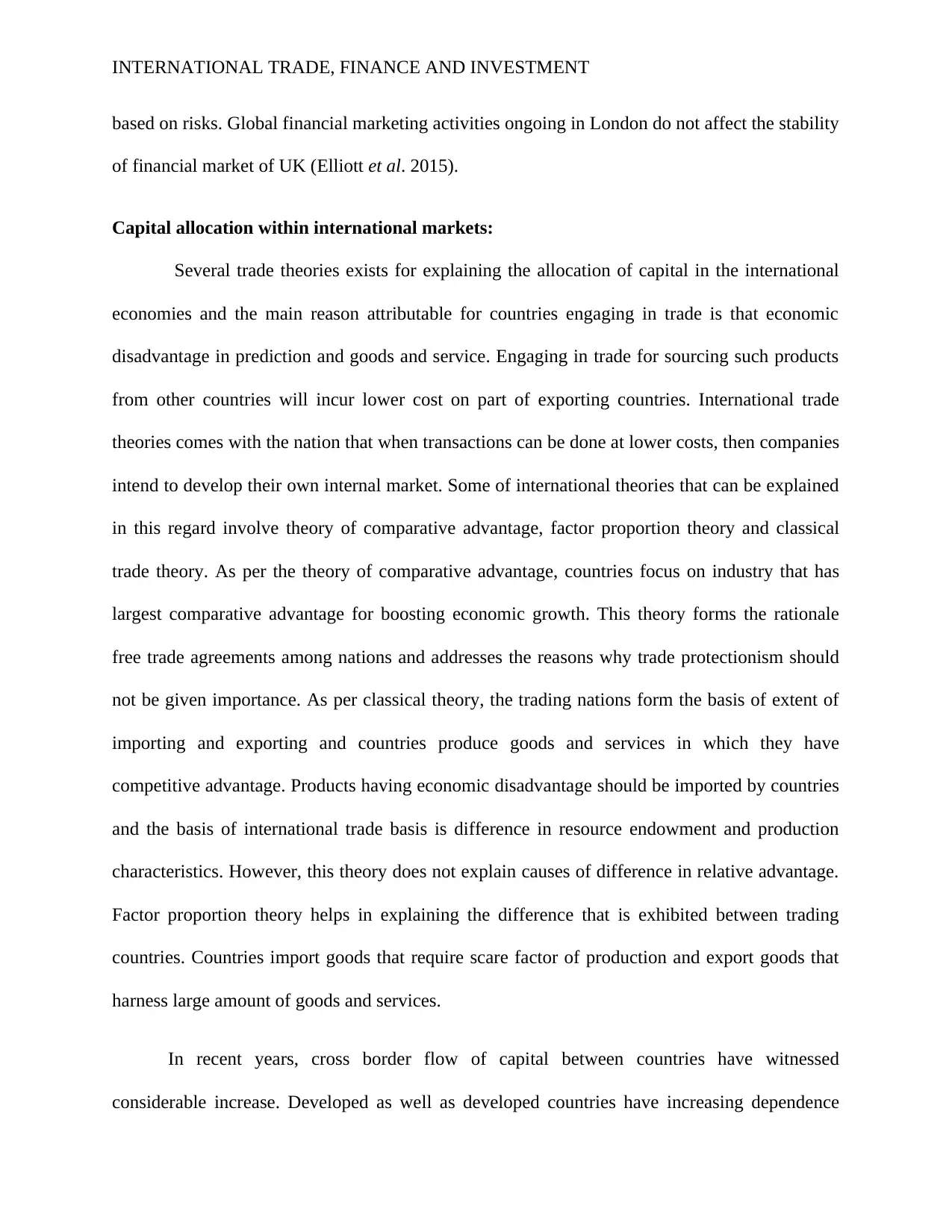
INTERNATIONAL TRADE, FINANCE AND INVESTMENT
based on risks. Global financial marketing activities ongoing in London do not affect the stability
of financial market of UK (Elliott et al. 2015).
Capital allocation within international markets:
Several trade theories exists for explaining the allocation of capital in the international
economies and the main reason attributable for countries engaging in trade is that economic
disadvantage in prediction and goods and service. Engaging in trade for sourcing such products
from other countries will incur lower cost on part of exporting countries. International trade
theories comes with the nation that when transactions can be done at lower costs, then companies
intend to develop their own internal market. Some of international theories that can be explained
in this regard involve theory of comparative advantage, factor proportion theory and classical
trade theory. As per the theory of comparative advantage, countries focus on industry that has
largest comparative advantage for boosting economic growth. This theory forms the rationale
free trade agreements among nations and addresses the reasons why trade protectionism should
not be given importance. As per classical theory, the trading nations form the basis of extent of
importing and exporting and countries produce goods and services in which they have
competitive advantage. Products having economic disadvantage should be imported by countries
and the basis of international trade basis is difference in resource endowment and production
characteristics. However, this theory does not explain causes of difference in relative advantage.
Factor proportion theory helps in explaining the difference that is exhibited between trading
countries. Countries import goods that require scare factor of production and export goods that
harness large amount of goods and services.
In recent years, cross border flow of capital between countries have witnessed
considerable increase. Developed as well as developed countries have increasing dependence
based on risks. Global financial marketing activities ongoing in London do not affect the stability
of financial market of UK (Elliott et al. 2015).
Capital allocation within international markets:
Several trade theories exists for explaining the allocation of capital in the international
economies and the main reason attributable for countries engaging in trade is that economic
disadvantage in prediction and goods and service. Engaging in trade for sourcing such products
from other countries will incur lower cost on part of exporting countries. International trade
theories comes with the nation that when transactions can be done at lower costs, then companies
intend to develop their own internal market. Some of international theories that can be explained
in this regard involve theory of comparative advantage, factor proportion theory and classical
trade theory. As per the theory of comparative advantage, countries focus on industry that has
largest comparative advantage for boosting economic growth. This theory forms the rationale
free trade agreements among nations and addresses the reasons why trade protectionism should
not be given importance. As per classical theory, the trading nations form the basis of extent of
importing and exporting and countries produce goods and services in which they have
competitive advantage. Products having economic disadvantage should be imported by countries
and the basis of international trade basis is difference in resource endowment and production
characteristics. However, this theory does not explain causes of difference in relative advantage.
Factor proportion theory helps in explaining the difference that is exhibited between trading
countries. Countries import goods that require scare factor of production and export goods that
harness large amount of goods and services.
In recent years, cross border flow of capital between countries have witnessed
considerable increase. Developed as well as developed countries have increasing dependence
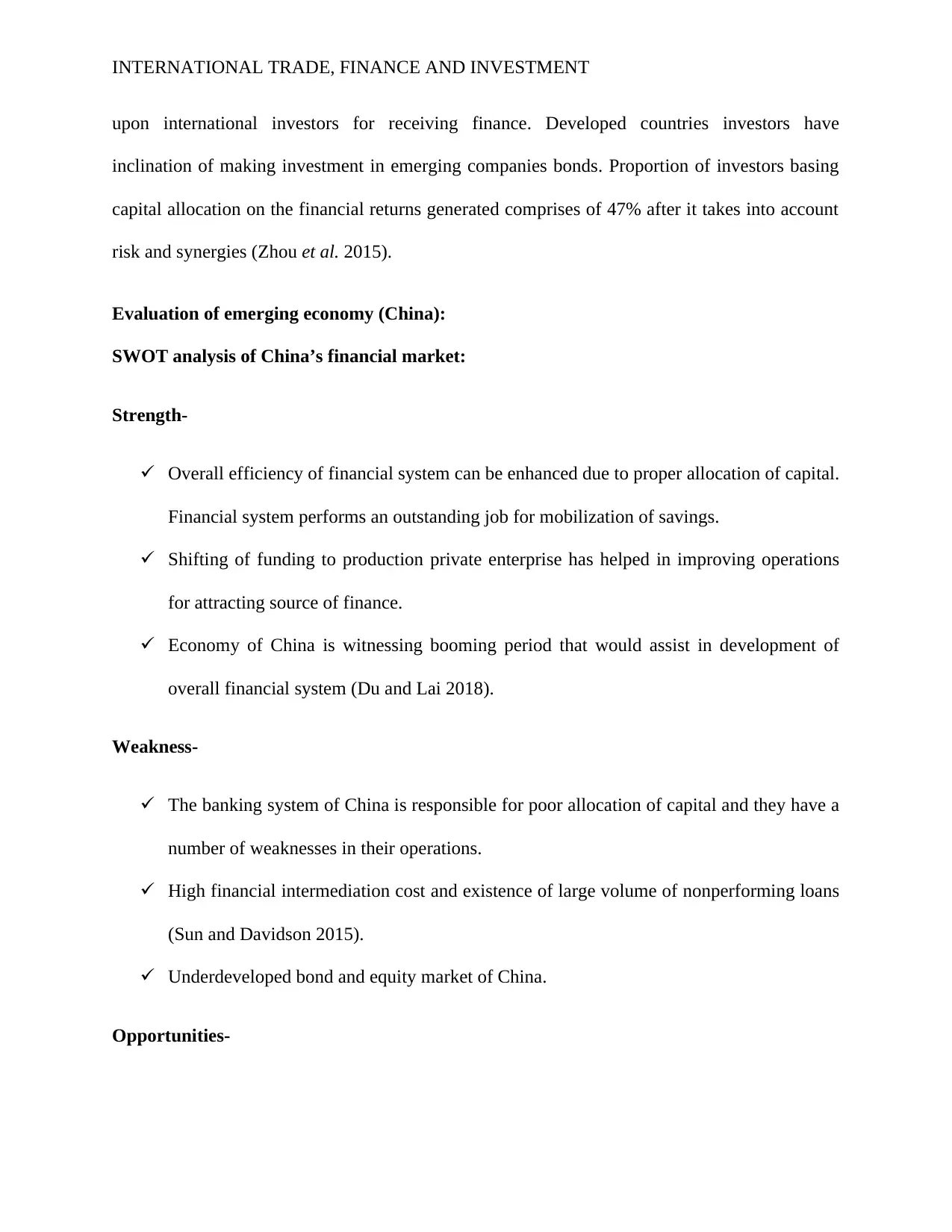
INTERNATIONAL TRADE, FINANCE AND INVESTMENT
upon international investors for receiving finance. Developed countries investors have
inclination of making investment in emerging companies bonds. Proportion of investors basing
capital allocation on the financial returns generated comprises of 47% after it takes into account
risk and synergies (Zhou et al. 2015).
Evaluation of emerging economy (China):
SWOT analysis of China’s financial market:
Strength-
Overall efficiency of financial system can be enhanced due to proper allocation of capital.
Financial system performs an outstanding job for mobilization of savings.
Shifting of funding to production private enterprise has helped in improving operations
for attracting source of finance.
Economy of China is witnessing booming period that would assist in development of
overall financial system (Du and Lai 2018).
Weakness-
The banking system of China is responsible for poor allocation of capital and they have a
number of weaknesses in their operations.
High financial intermediation cost and existence of large volume of nonperforming loans
(Sun and Davidson 2015).
Underdeveloped bond and equity market of China.
Opportunities-
upon international investors for receiving finance. Developed countries investors have
inclination of making investment in emerging companies bonds. Proportion of investors basing
capital allocation on the financial returns generated comprises of 47% after it takes into account
risk and synergies (Zhou et al. 2015).
Evaluation of emerging economy (China):
SWOT analysis of China’s financial market:
Strength-
Overall efficiency of financial system can be enhanced due to proper allocation of capital.
Financial system performs an outstanding job for mobilization of savings.
Shifting of funding to production private enterprise has helped in improving operations
for attracting source of finance.
Economy of China is witnessing booming period that would assist in development of
overall financial system (Du and Lai 2018).
Weakness-
The banking system of China is responsible for poor allocation of capital and they have a
number of weaknesses in their operations.
High financial intermediation cost and existence of large volume of nonperforming loans
(Sun and Davidson 2015).
Underdeveloped bond and equity market of China.
Opportunities-
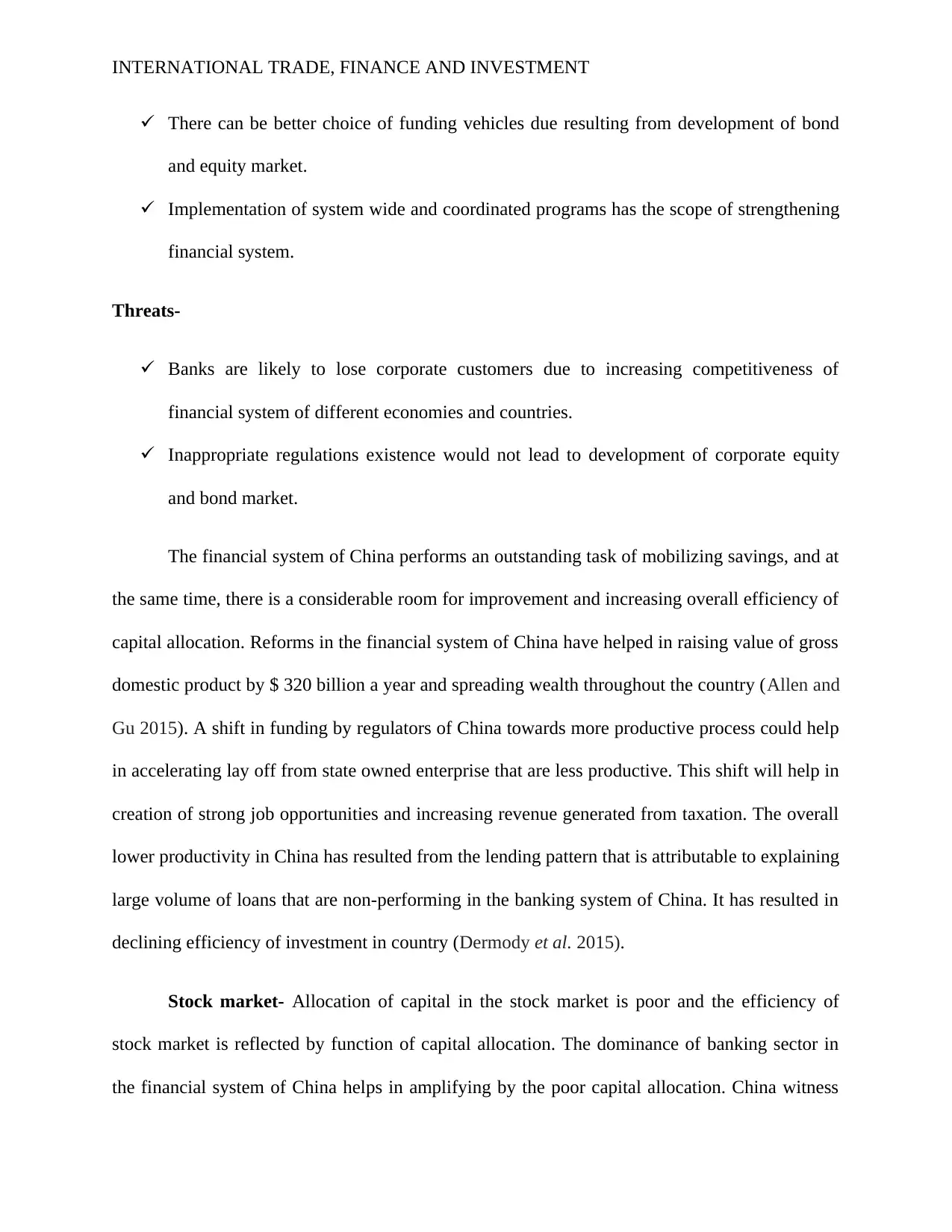
INTERNATIONAL TRADE, FINANCE AND INVESTMENT
There can be better choice of funding vehicles due resulting from development of bond
and equity market.
Implementation of system wide and coordinated programs has the scope of strengthening
financial system.
Threats-
Banks are likely to lose corporate customers due to increasing competitiveness of
financial system of different economies and countries.
Inappropriate regulations existence would not lead to development of corporate equity
and bond market.
The financial system of China performs an outstanding task of mobilizing savings, and at
the same time, there is a considerable room for improvement and increasing overall efficiency of
capital allocation. Reforms in the financial system of China have helped in raising value of gross
domestic product by $ 320 billion a year and spreading wealth throughout the country (Allen and
Gu 2015). A shift in funding by regulators of China towards more productive process could help
in accelerating lay off from state owned enterprise that are less productive. This shift will help in
creation of strong job opportunities and increasing revenue generated from taxation. The overall
lower productivity in China has resulted from the lending pattern that is attributable to explaining
large volume of loans that are non-performing in the banking system of China. It has resulted in
declining efficiency of investment in country (Dermody et al. 2015).
Stock market- Allocation of capital in the stock market is poor and the efficiency of
stock market is reflected by function of capital allocation. The dominance of banking sector in
the financial system of China helps in amplifying by the poor capital allocation. China witness
There can be better choice of funding vehicles due resulting from development of bond
and equity market.
Implementation of system wide and coordinated programs has the scope of strengthening
financial system.
Threats-
Banks are likely to lose corporate customers due to increasing competitiveness of
financial system of different economies and countries.
Inappropriate regulations existence would not lead to development of corporate equity
and bond market.
The financial system of China performs an outstanding task of mobilizing savings, and at
the same time, there is a considerable room for improvement and increasing overall efficiency of
capital allocation. Reforms in the financial system of China have helped in raising value of gross
domestic product by $ 320 billion a year and spreading wealth throughout the country (Allen and
Gu 2015). A shift in funding by regulators of China towards more productive process could help
in accelerating lay off from state owned enterprise that are less productive. This shift will help in
creation of strong job opportunities and increasing revenue generated from taxation. The overall
lower productivity in China has resulted from the lending pattern that is attributable to explaining
large volume of loans that are non-performing in the banking system of China. It has resulted in
declining efficiency of investment in country (Dermody et al. 2015).
Stock market- Allocation of capital in the stock market is poor and the efficiency of
stock market is reflected by function of capital allocation. The dominance of banking sector in
the financial system of China helps in amplifying by the poor capital allocation. China witness
Paraphrase This Document
Need a fresh take? Get an instant paraphrase of this document with our AI Paraphraser
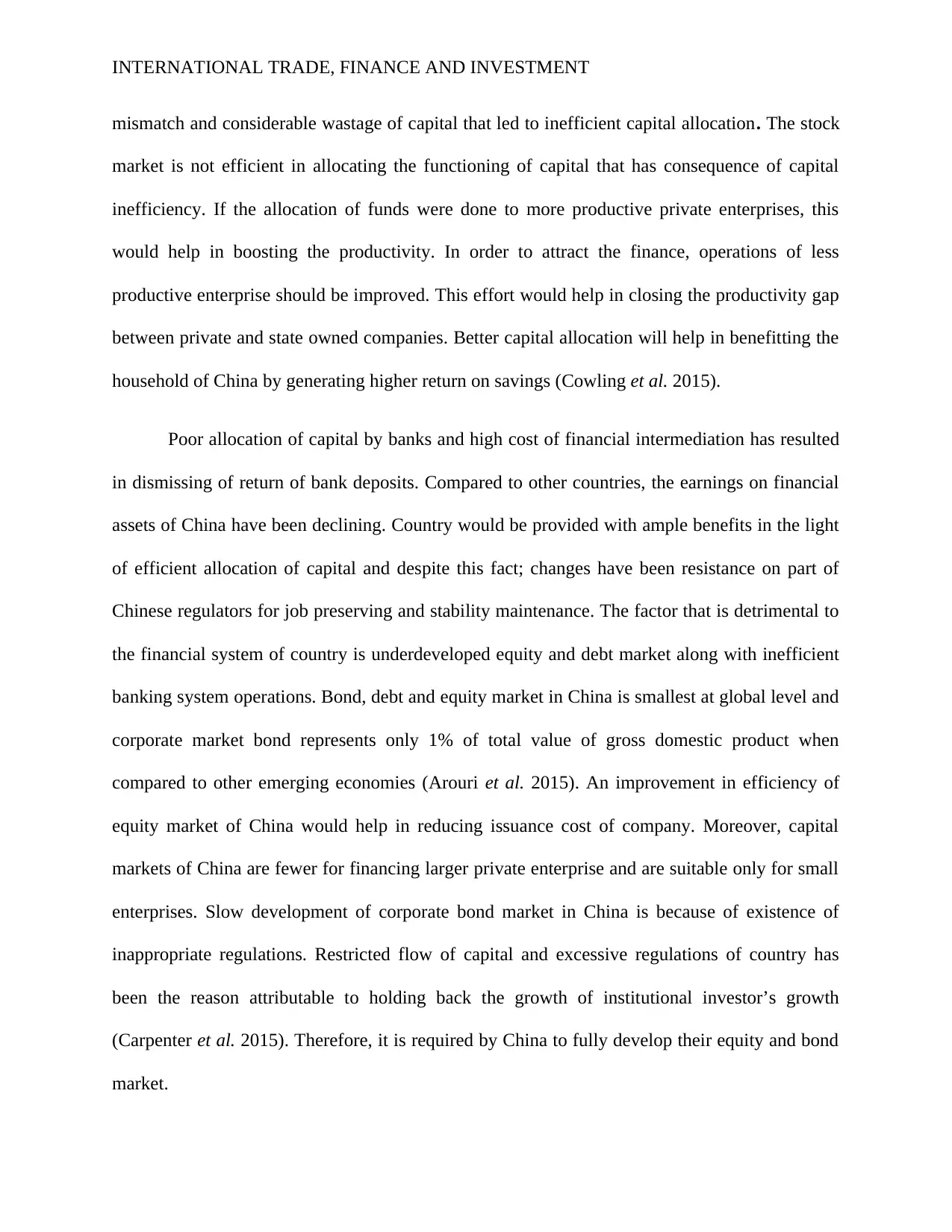
INTERNATIONAL TRADE, FINANCE AND INVESTMENT
mismatch and considerable wastage of capital that led to inefficient capital allocation. The stock
market is not efficient in allocating the functioning of capital that has consequence of capital
inefficiency. If the allocation of funds were done to more productive private enterprises, this
would help in boosting the productivity. In order to attract the finance, operations of less
productive enterprise should be improved. This effort would help in closing the productivity gap
between private and state owned companies. Better capital allocation will help in benefitting the
household of China by generating higher return on savings (Cowling et al. 2015).
Poor allocation of capital by banks and high cost of financial intermediation has resulted
in dismissing of return of bank deposits. Compared to other countries, the earnings on financial
assets of China have been declining. Country would be provided with ample benefits in the light
of efficient allocation of capital and despite this fact; changes have been resistance on part of
Chinese regulators for job preserving and stability maintenance. The factor that is detrimental to
the financial system of country is underdeveloped equity and debt market along with inefficient
banking system operations. Bond, debt and equity market in China is smallest at global level and
corporate market bond represents only 1% of total value of gross domestic product when
compared to other emerging economies (Arouri et al. 2015). An improvement in efficiency of
equity market of China would help in reducing issuance cost of company. Moreover, capital
markets of China are fewer for financing larger private enterprise and are suitable only for small
enterprises. Slow development of corporate bond market in China is because of existence of
inappropriate regulations. Restricted flow of capital and excessive regulations of country has
been the reason attributable to holding back the growth of institutional investor’s growth
(Carpenter et al. 2015). Therefore, it is required by China to fully develop their equity and bond
market.
mismatch and considerable wastage of capital that led to inefficient capital allocation. The stock
market is not efficient in allocating the functioning of capital that has consequence of capital
inefficiency. If the allocation of funds were done to more productive private enterprises, this
would help in boosting the productivity. In order to attract the finance, operations of less
productive enterprise should be improved. This effort would help in closing the productivity gap
between private and state owned companies. Better capital allocation will help in benefitting the
household of China by generating higher return on savings (Cowling et al. 2015).
Poor allocation of capital by banks and high cost of financial intermediation has resulted
in dismissing of return of bank deposits. Compared to other countries, the earnings on financial
assets of China have been declining. Country would be provided with ample benefits in the light
of efficient allocation of capital and despite this fact; changes have been resistance on part of
Chinese regulators for job preserving and stability maintenance. The factor that is detrimental to
the financial system of country is underdeveloped equity and debt market along with inefficient
banking system operations. Bond, debt and equity market in China is smallest at global level and
corporate market bond represents only 1% of total value of gross domestic product when
compared to other emerging economies (Arouri et al. 2015). An improvement in efficiency of
equity market of China would help in reducing issuance cost of company. Moreover, capital
markets of China are fewer for financing larger private enterprise and are suitable only for small
enterprises. Slow development of corporate bond market in China is because of existence of
inappropriate regulations. Restricted flow of capital and excessive regulations of country has
been the reason attributable to holding back the growth of institutional investor’s growth
(Carpenter et al. 2015). Therefore, it is required by China to fully develop their equity and bond
market.
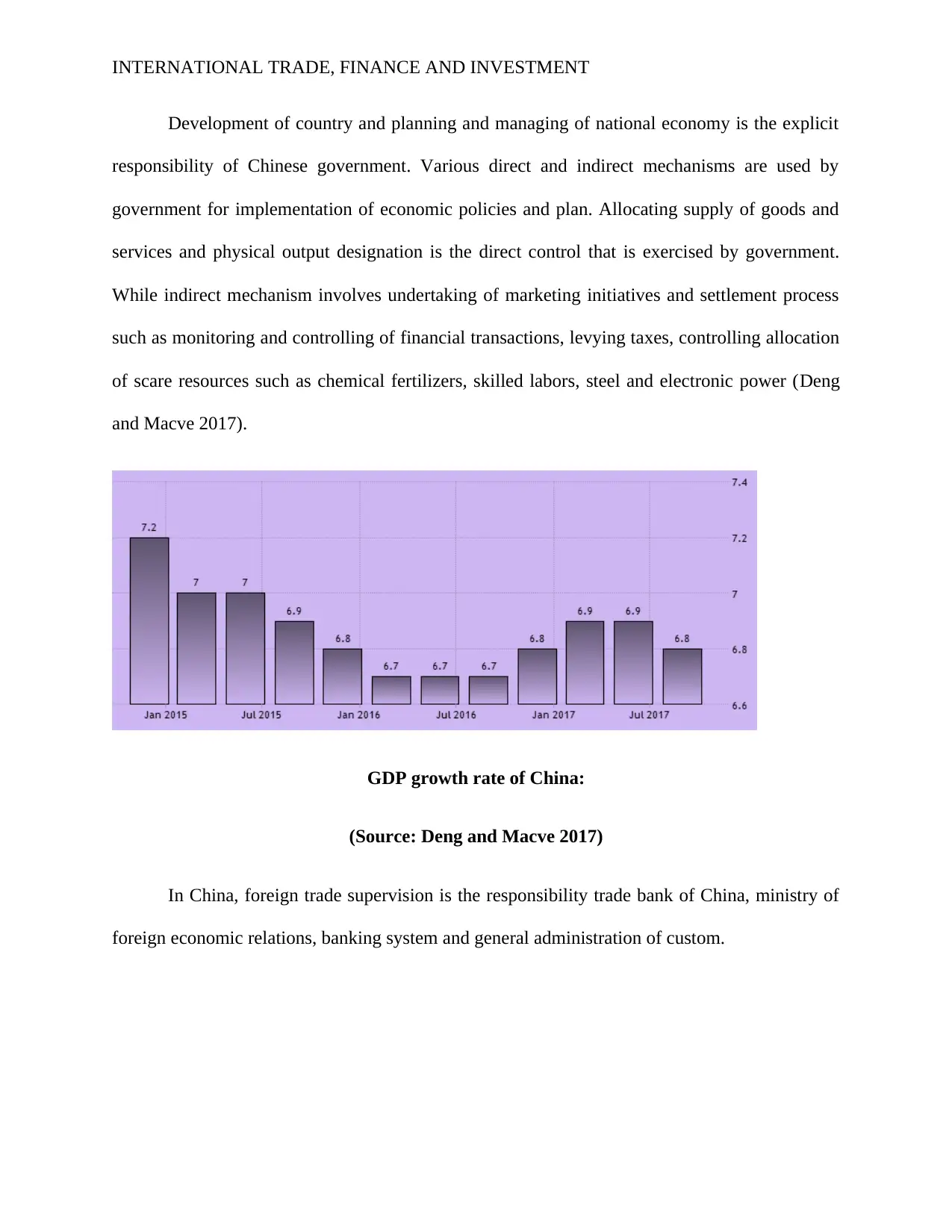
INTERNATIONAL TRADE, FINANCE AND INVESTMENT
Development of country and planning and managing of national economy is the explicit
responsibility of Chinese government. Various direct and indirect mechanisms are used by
government for implementation of economic policies and plan. Allocating supply of goods and
services and physical output designation is the direct control that is exercised by government.
While indirect mechanism involves undertaking of marketing initiatives and settlement process
such as monitoring and controlling of financial transactions, levying taxes, controlling allocation
of scare resources such as chemical fertilizers, skilled labors, steel and electronic power (Deng
and Macve 2017).
GDP growth rate of China:
(Source: Deng and Macve 2017)
In China, foreign trade supervision is the responsibility trade bank of China, ministry of
foreign economic relations, banking system and general administration of custom.
Development of country and planning and managing of national economy is the explicit
responsibility of Chinese government. Various direct and indirect mechanisms are used by
government for implementation of economic policies and plan. Allocating supply of goods and
services and physical output designation is the direct control that is exercised by government.
While indirect mechanism involves undertaking of marketing initiatives and settlement process
such as monitoring and controlling of financial transactions, levying taxes, controlling allocation
of scare resources such as chemical fertilizers, skilled labors, steel and electronic power (Deng
and Macve 2017).
GDP growth rate of China:
(Source: Deng and Macve 2017)
In China, foreign trade supervision is the responsibility trade bank of China, ministry of
foreign economic relations, banking system and general administration of custom.
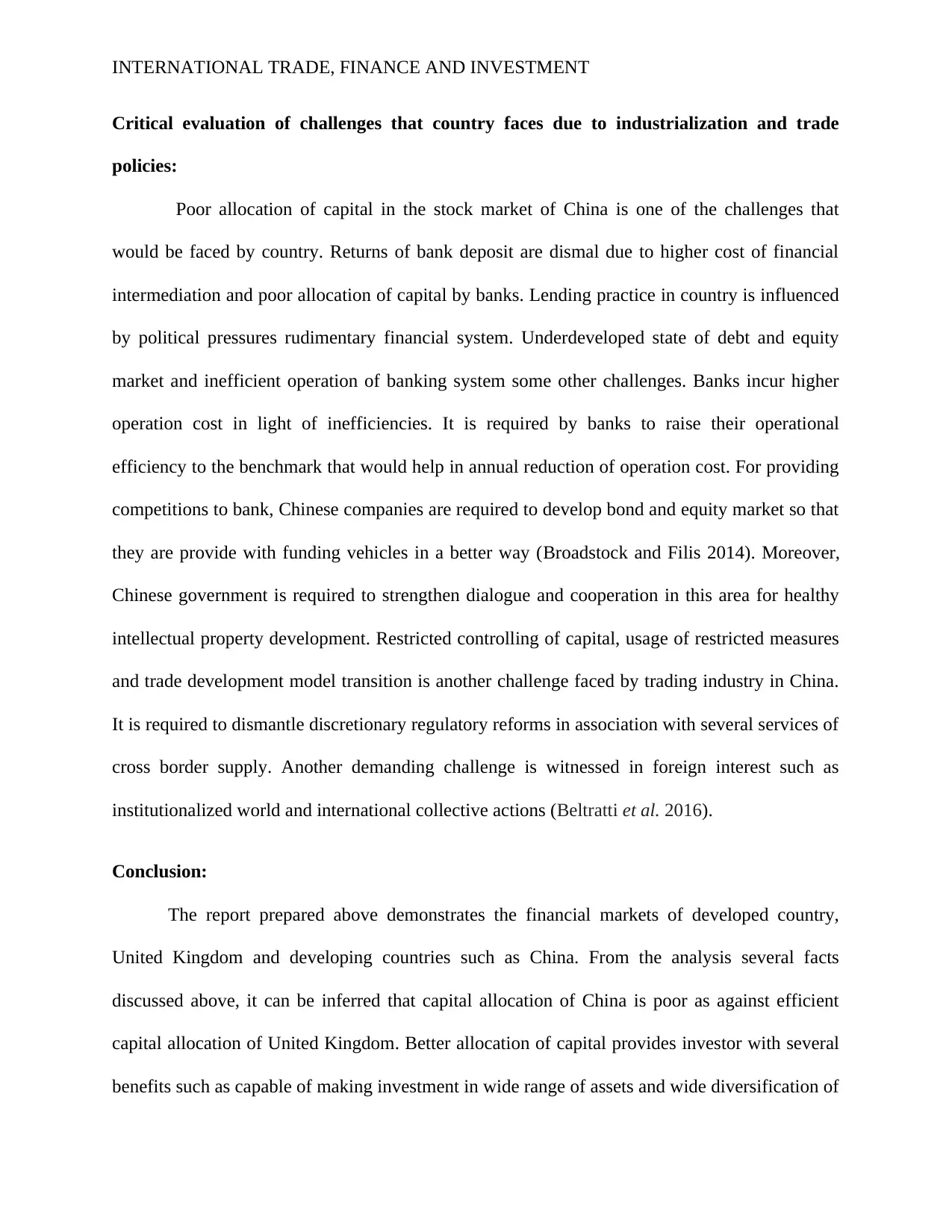
INTERNATIONAL TRADE, FINANCE AND INVESTMENT
Critical evaluation of challenges that country faces due to industrialization and trade
policies:
Poor allocation of capital in the stock market of China is one of the challenges that
would be faced by country. Returns of bank deposit are dismal due to higher cost of financial
intermediation and poor allocation of capital by banks. Lending practice in country is influenced
by political pressures rudimentary financial system. Underdeveloped state of debt and equity
market and inefficient operation of banking system some other challenges. Banks incur higher
operation cost in light of inefficiencies. It is required by banks to raise their operational
efficiency to the benchmark that would help in annual reduction of operation cost. For providing
competitions to bank, Chinese companies are required to develop bond and equity market so that
they are provide with funding vehicles in a better way (Broadstock and Filis 2014). Moreover,
Chinese government is required to strengthen dialogue and cooperation in this area for healthy
intellectual property development. Restricted controlling of capital, usage of restricted measures
and trade development model transition is another challenge faced by trading industry in China.
It is required to dismantle discretionary regulatory reforms in association with several services of
cross border supply. Another demanding challenge is witnessed in foreign interest such as
institutionalized world and international collective actions (Beltratti et al. 2016).
Conclusion:
The report prepared above demonstrates the financial markets of developed country,
United Kingdom and developing countries such as China. From the analysis several facts
discussed above, it can be inferred that capital allocation of China is poor as against efficient
capital allocation of United Kingdom. Better allocation of capital provides investor with several
benefits such as capable of making investment in wide range of assets and wide diversification of
Critical evaluation of challenges that country faces due to industrialization and trade
policies:
Poor allocation of capital in the stock market of China is one of the challenges that
would be faced by country. Returns of bank deposit are dismal due to higher cost of financial
intermediation and poor allocation of capital by banks. Lending practice in country is influenced
by political pressures rudimentary financial system. Underdeveloped state of debt and equity
market and inefficient operation of banking system some other challenges. Banks incur higher
operation cost in light of inefficiencies. It is required by banks to raise their operational
efficiency to the benchmark that would help in annual reduction of operation cost. For providing
competitions to bank, Chinese companies are required to develop bond and equity market so that
they are provide with funding vehicles in a better way (Broadstock and Filis 2014). Moreover,
Chinese government is required to strengthen dialogue and cooperation in this area for healthy
intellectual property development. Restricted controlling of capital, usage of restricted measures
and trade development model transition is another challenge faced by trading industry in China.
It is required to dismantle discretionary regulatory reforms in association with several services of
cross border supply. Another demanding challenge is witnessed in foreign interest such as
institutionalized world and international collective actions (Beltratti et al. 2016).
Conclusion:
The report prepared above demonstrates the financial markets of developed country,
United Kingdom and developing countries such as China. From the analysis several facts
discussed above, it can be inferred that capital allocation of China is poor as against efficient
capital allocation of United Kingdom. Better allocation of capital provides investor with several
benefits such as capable of making investment in wide range of assets and wide diversification of
Secure Best Marks with AI Grader
Need help grading? Try our AI Grader for instant feedback on your assignments.
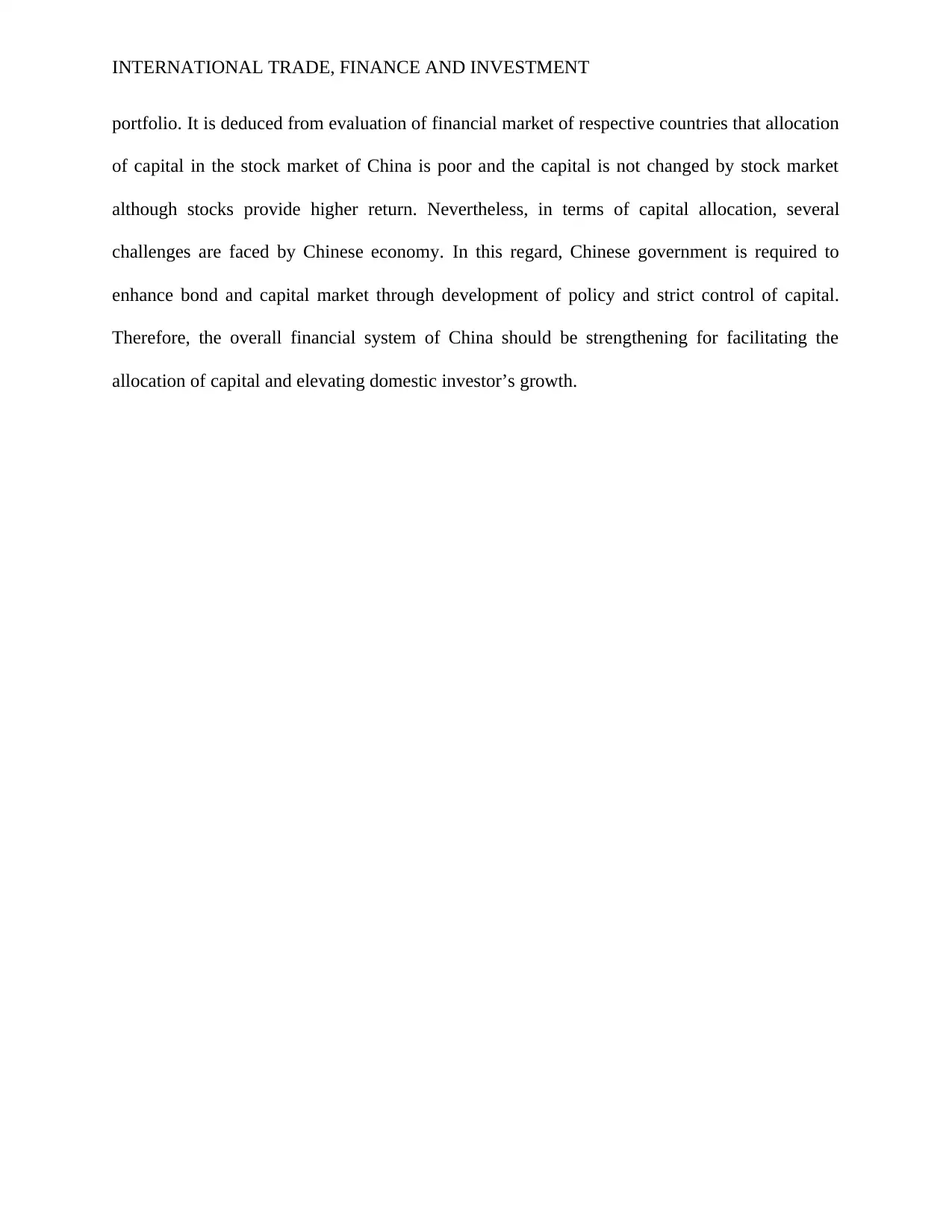
INTERNATIONAL TRADE, FINANCE AND INVESTMENT
portfolio. It is deduced from evaluation of financial market of respective countries that allocation
of capital in the stock market of China is poor and the capital is not changed by stock market
although stocks provide higher return. Nevertheless, in terms of capital allocation, several
challenges are faced by Chinese economy. In this regard, Chinese government is required to
enhance bond and capital market through development of policy and strict control of capital.
Therefore, the overall financial system of China should be strengthening for facilitating the
allocation of capital and elevating domestic investor’s growth.
portfolio. It is deduced from evaluation of financial market of respective countries that allocation
of capital in the stock market of China is poor and the capital is not changed by stock market
although stocks provide higher return. Nevertheless, in terms of capital allocation, several
challenges are faced by Chinese economy. In this regard, Chinese government is required to
enhance bond and capital market through development of policy and strict control of capital.
Therefore, the overall financial system of China should be strengthening for facilitating the
allocation of capital and elevating domestic investor’s growth.
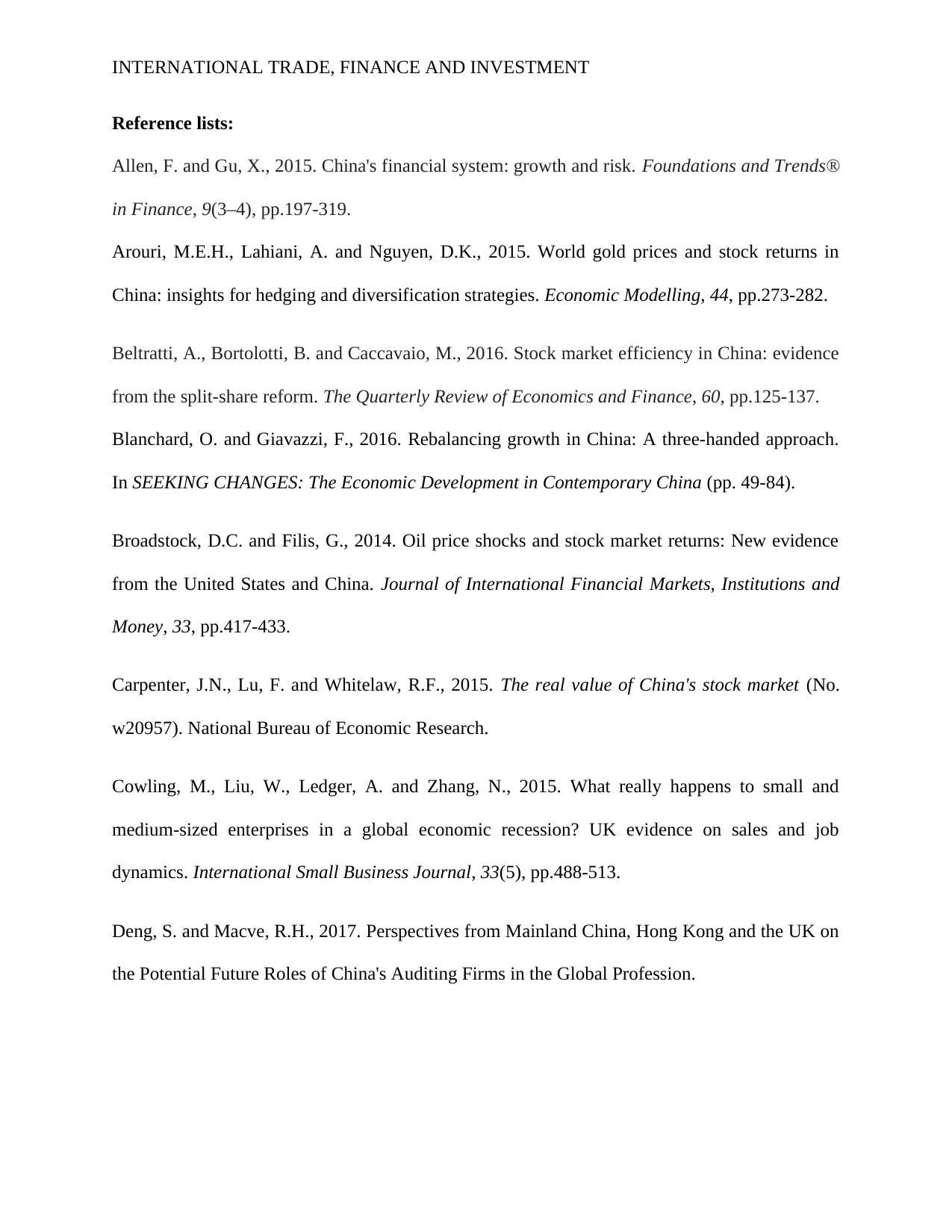
INTERNATIONAL TRADE, FINANCE AND INVESTMENT
Reference lists:
Allen, F. and Gu, X., 2015. China's financial system: growth and risk. Foundations and Trends®
in Finance, 9(3–4), pp.197-319.
Arouri, M.E.H., Lahiani, A. and Nguyen, D.K., 2015. World gold prices and stock returns in
China: insights for hedging and diversification strategies. Economic Modelling, 44, pp.273-282.
Beltratti, A., Bortolotti, B. and Caccavaio, M., 2016. Stock market efficiency in China: evidence
from the split-share reform. The Quarterly Review of Economics and Finance, 60, pp.125-137.
Blanchard, O. and Giavazzi, F., 2016. Rebalancing growth in China: A three-handed approach.
In SEEKING CHANGES: The Economic Development in Contemporary China (pp. 49-84).
Broadstock, D.C. and Filis, G., 2014. Oil price shocks and stock market returns: New evidence
from the United States and China. Journal of International Financial Markets, Institutions and
Money, 33, pp.417-433.
Carpenter, J.N., Lu, F. and Whitelaw, R.F., 2015. The real value of China's stock market (No.
w20957). National Bureau of Economic Research.
Cowling, M., Liu, W., Ledger, A. and Zhang, N., 2015. What really happens to small and
medium-sized enterprises in a global economic recession? UK evidence on sales and job
dynamics. International Small Business Journal, 33(5), pp.488-513.
Deng, S. and Macve, R.H., 2017. Perspectives from Mainland China, Hong Kong and the UK on
the Potential Future Roles of China's Auditing Firms in the Global Profession.
Reference lists:
Allen, F. and Gu, X., 2015. China's financial system: growth and risk. Foundations and Trends®
in Finance, 9(3–4), pp.197-319.
Arouri, M.E.H., Lahiani, A. and Nguyen, D.K., 2015. World gold prices and stock returns in
China: insights for hedging and diversification strategies. Economic Modelling, 44, pp.273-282.
Beltratti, A., Bortolotti, B. and Caccavaio, M., 2016. Stock market efficiency in China: evidence
from the split-share reform. The Quarterly Review of Economics and Finance, 60, pp.125-137.
Blanchard, O. and Giavazzi, F., 2016. Rebalancing growth in China: A three-handed approach.
In SEEKING CHANGES: The Economic Development in Contemporary China (pp. 49-84).
Broadstock, D.C. and Filis, G., 2014. Oil price shocks and stock market returns: New evidence
from the United States and China. Journal of International Financial Markets, Institutions and
Money, 33, pp.417-433.
Carpenter, J.N., Lu, F. and Whitelaw, R.F., 2015. The real value of China's stock market (No.
w20957). National Bureau of Economic Research.
Cowling, M., Liu, W., Ledger, A. and Zhang, N., 2015. What really happens to small and
medium-sized enterprises in a global economic recession? UK evidence on sales and job
dynamics. International Small Business Journal, 33(5), pp.488-513.
Deng, S. and Macve, R.H., 2017. Perspectives from Mainland China, Hong Kong and the UK on
the Potential Future Roles of China's Auditing Firms in the Global Profession.
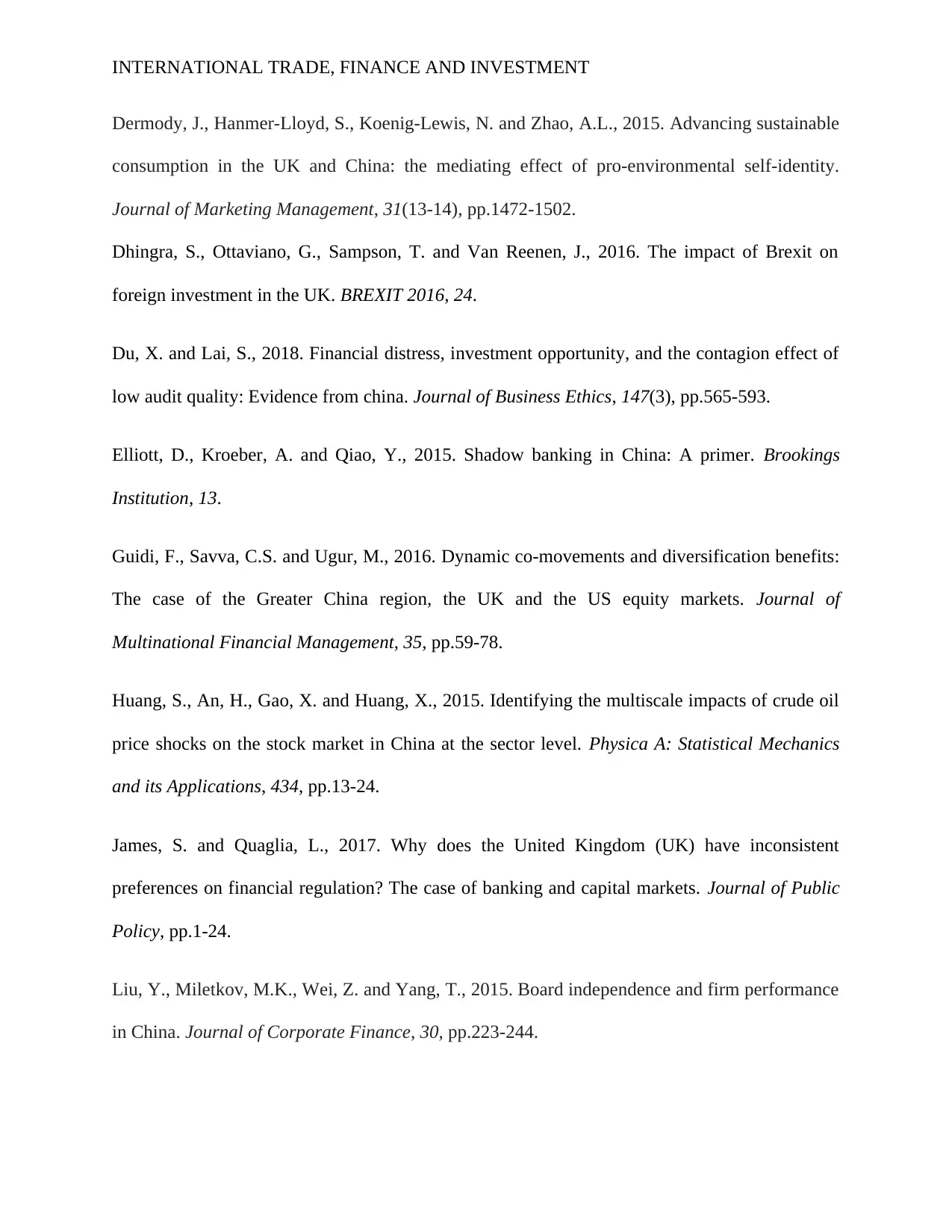
INTERNATIONAL TRADE, FINANCE AND INVESTMENT
Dermody, J., Hanmer-Lloyd, S., Koenig-Lewis, N. and Zhao, A.L., 2015. Advancing sustainable
consumption in the UK and China: the mediating effect of pro-environmental self-identity.
Journal of Marketing Management, 31(13-14), pp.1472-1502.
Dhingra, S., Ottaviano, G., Sampson, T. and Van Reenen, J., 2016. The impact of Brexit on
foreign investment in the UK. BREXIT 2016, 24.
Du, X. and Lai, S., 2018. Financial distress, investment opportunity, and the contagion effect of
low audit quality: Evidence from china. Journal of Business Ethics, 147(3), pp.565-593.
Elliott, D., Kroeber, A. and Qiao, Y., 2015. Shadow banking in China: A primer. Brookings
Institution, 13.
Guidi, F., Savva, C.S. and Ugur, M., 2016. Dynamic co-movements and diversification benefits:
The case of the Greater China region, the UK and the US equity markets. Journal of
Multinational Financial Management, 35, pp.59-78.
Huang, S., An, H., Gao, X. and Huang, X., 2015. Identifying the multiscale impacts of crude oil
price shocks on the stock market in China at the sector level. Physica A: Statistical Mechanics
and its Applications, 434, pp.13-24.
James, S. and Quaglia, L., 2017. Why does the United Kingdom (UK) have inconsistent
preferences on financial regulation? The case of banking and capital markets. Journal of Public
Policy, pp.1-24.
Liu, Y., Miletkov, M.K., Wei, Z. and Yang, T., 2015. Board independence and firm performance
in China. Journal of Corporate Finance, 30, pp.223-244.
Dermody, J., Hanmer-Lloyd, S., Koenig-Lewis, N. and Zhao, A.L., 2015. Advancing sustainable
consumption in the UK and China: the mediating effect of pro-environmental self-identity.
Journal of Marketing Management, 31(13-14), pp.1472-1502.
Dhingra, S., Ottaviano, G., Sampson, T. and Van Reenen, J., 2016. The impact of Brexit on
foreign investment in the UK. BREXIT 2016, 24.
Du, X. and Lai, S., 2018. Financial distress, investment opportunity, and the contagion effect of
low audit quality: Evidence from china. Journal of Business Ethics, 147(3), pp.565-593.
Elliott, D., Kroeber, A. and Qiao, Y., 2015. Shadow banking in China: A primer. Brookings
Institution, 13.
Guidi, F., Savva, C.S. and Ugur, M., 2016. Dynamic co-movements and diversification benefits:
The case of the Greater China region, the UK and the US equity markets. Journal of
Multinational Financial Management, 35, pp.59-78.
Huang, S., An, H., Gao, X. and Huang, X., 2015. Identifying the multiscale impacts of crude oil
price shocks on the stock market in China at the sector level. Physica A: Statistical Mechanics
and its Applications, 434, pp.13-24.
James, S. and Quaglia, L., 2017. Why does the United Kingdom (UK) have inconsistent
preferences on financial regulation? The case of banking and capital markets. Journal of Public
Policy, pp.1-24.
Liu, Y., Miletkov, M.K., Wei, Z. and Yang, T., 2015. Board independence and firm performance
in China. Journal of Corporate Finance, 30, pp.223-244.
Paraphrase This Document
Need a fresh take? Get an instant paraphrase of this document with our AI Paraphraser
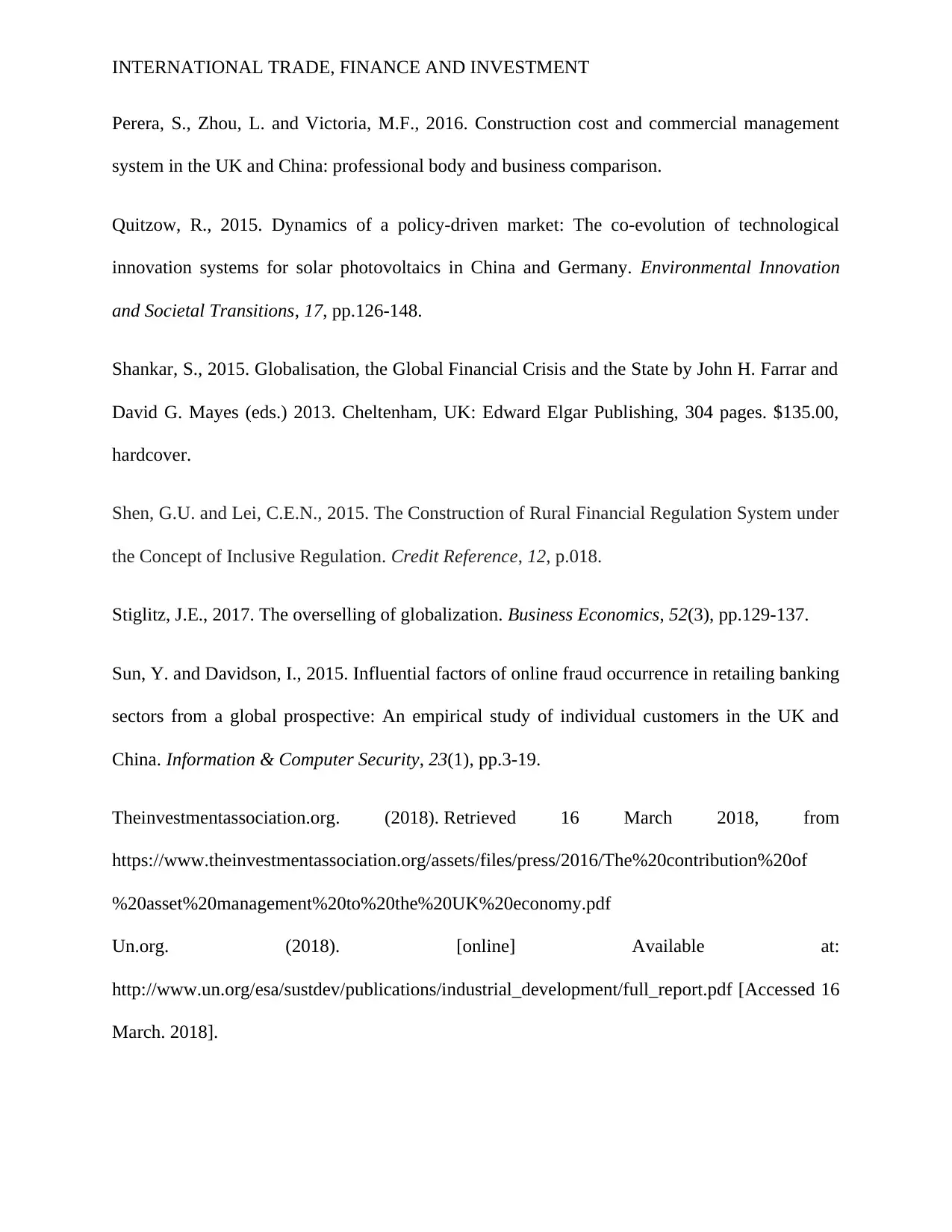
INTERNATIONAL TRADE, FINANCE AND INVESTMENT
Perera, S., Zhou, L. and Victoria, M.F., 2016. Construction cost and commercial management
system in the UK and China: professional body and business comparison.
Quitzow, R., 2015. Dynamics of a policy-driven market: The co-evolution of technological
innovation systems for solar photovoltaics in China and Germany. Environmental Innovation
and Societal Transitions, 17, pp.126-148.
Shankar, S., 2015. Globalisation, the Global Financial Crisis and the State by John H. Farrar and
David G. Mayes (eds.) 2013. Cheltenham, UK: Edward Elgar Publishing, 304 pages. $135.00,
hardcover.
Shen, G.U. and Lei, C.E.N., 2015. The Construction of Rural Financial Regulation System under
the Concept of Inclusive Regulation. Credit Reference, 12, p.018.
Stiglitz, J.E., 2017. The overselling of globalization. Business Economics, 52(3), pp.129-137.
Sun, Y. and Davidson, I., 2015. Influential factors of online fraud occurrence in retailing banking
sectors from a global prospective: An empirical study of individual customers in the UK and
China. Information & Computer Security, 23(1), pp.3-19.
Theinvestmentassociation.org. (2018). Retrieved 16 March 2018, from
https://www.theinvestmentassociation.org/assets/files/press/2016/The%20contribution%20of
%20asset%20management%20to%20the%20UK%20economy.pdf
Un.org. (2018). [online] Available at:
http://www.un.org/esa/sustdev/publications/industrial_development/full_report.pdf [Accessed 16
March. 2018].
Perera, S., Zhou, L. and Victoria, M.F., 2016. Construction cost and commercial management
system in the UK and China: professional body and business comparison.
Quitzow, R., 2015. Dynamics of a policy-driven market: The co-evolution of technological
innovation systems for solar photovoltaics in China and Germany. Environmental Innovation
and Societal Transitions, 17, pp.126-148.
Shankar, S., 2015. Globalisation, the Global Financial Crisis and the State by John H. Farrar and
David G. Mayes (eds.) 2013. Cheltenham, UK: Edward Elgar Publishing, 304 pages. $135.00,
hardcover.
Shen, G.U. and Lei, C.E.N., 2015. The Construction of Rural Financial Regulation System under
the Concept of Inclusive Regulation. Credit Reference, 12, p.018.
Stiglitz, J.E., 2017. The overselling of globalization. Business Economics, 52(3), pp.129-137.
Sun, Y. and Davidson, I., 2015. Influential factors of online fraud occurrence in retailing banking
sectors from a global prospective: An empirical study of individual customers in the UK and
China. Information & Computer Security, 23(1), pp.3-19.
Theinvestmentassociation.org. (2018). Retrieved 16 March 2018, from
https://www.theinvestmentassociation.org/assets/files/press/2016/The%20contribution%20of
%20asset%20management%20to%20the%20UK%20economy.pdf
Un.org. (2018). [online] Available at:
http://www.un.org/esa/sustdev/publications/industrial_development/full_report.pdf [Accessed 16
March. 2018].
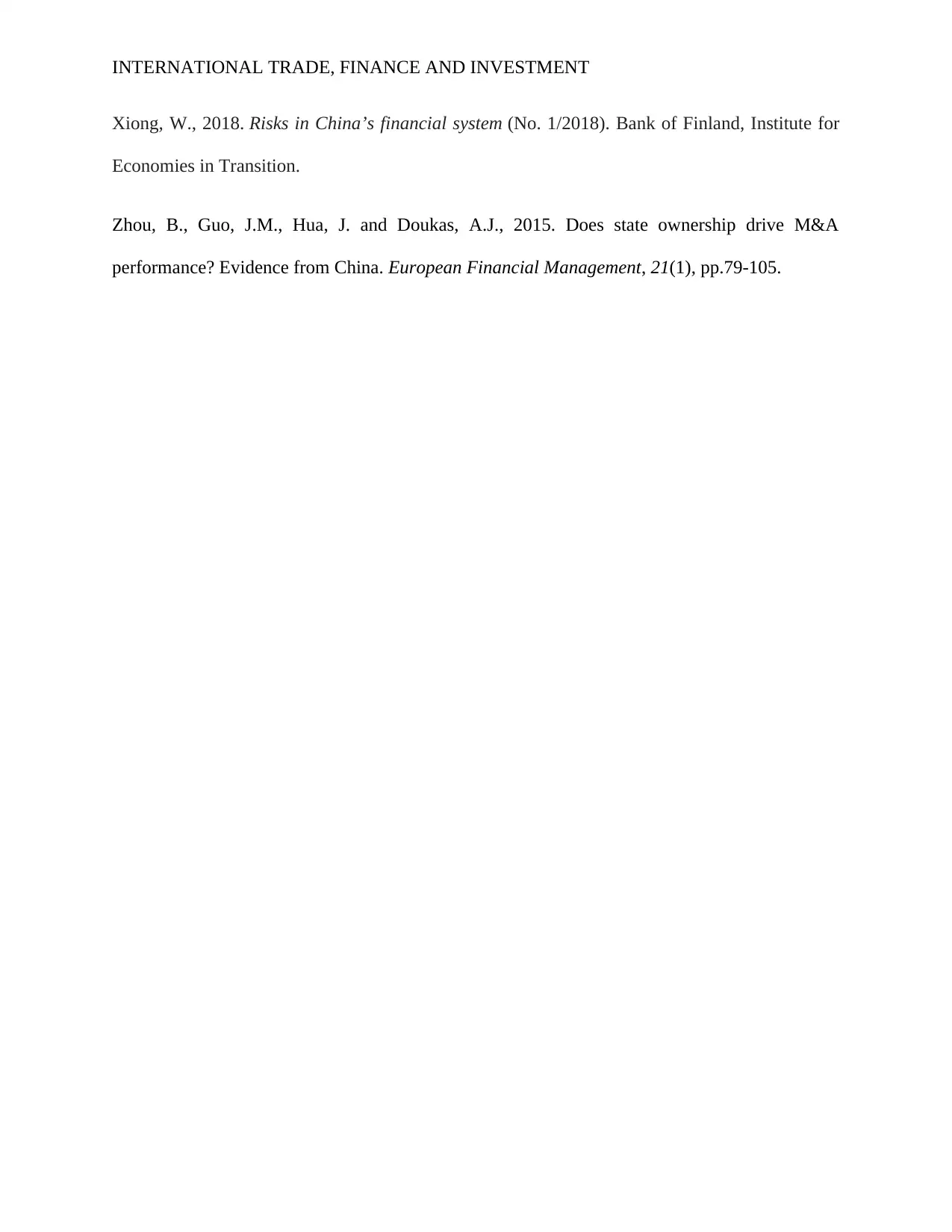
INTERNATIONAL TRADE, FINANCE AND INVESTMENT
Xiong, W., 2018. Risks in China’s financial system (No. 1/2018). Bank of Finland, Institute for
Economies in Transition.
Zhou, B., Guo, J.M., Hua, J. and Doukas, A.J., 2015. Does state ownership drive M&A
performance? Evidence from China. European Financial Management, 21(1), pp.79-105.
Xiong, W., 2018. Risks in China’s financial system (No. 1/2018). Bank of Finland, Institute for
Economies in Transition.
Zhou, B., Guo, J.M., Hua, J. and Doukas, A.J., 2015. Does state ownership drive M&A
performance? Evidence from China. European Financial Management, 21(1), pp.79-105.
1 out of 21
Related Documents
Your All-in-One AI-Powered Toolkit for Academic Success.
+13062052269
info@desklib.com
Available 24*7 on WhatsApp / Email
![[object Object]](/_next/static/media/star-bottom.7253800d.svg)
Unlock your academic potential
© 2024 | Zucol Services PVT LTD | All rights reserved.




